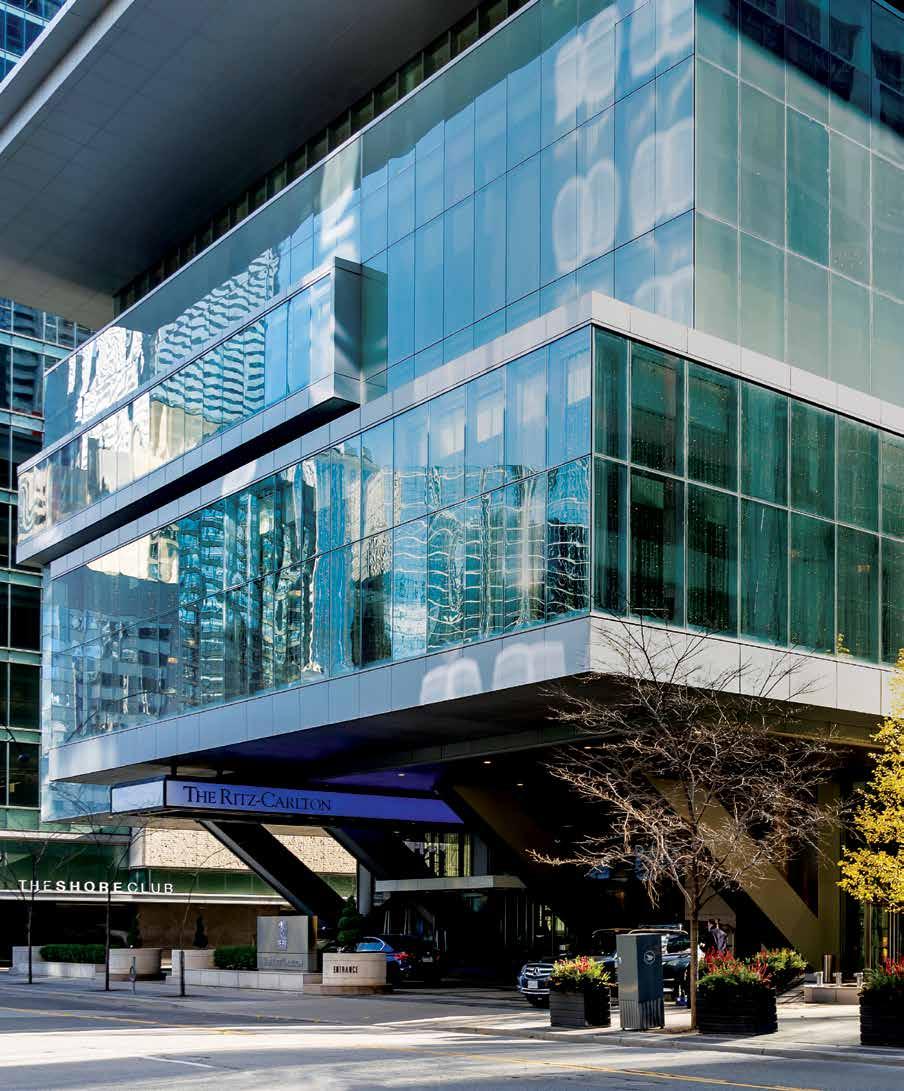




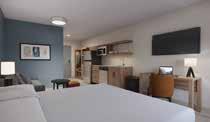

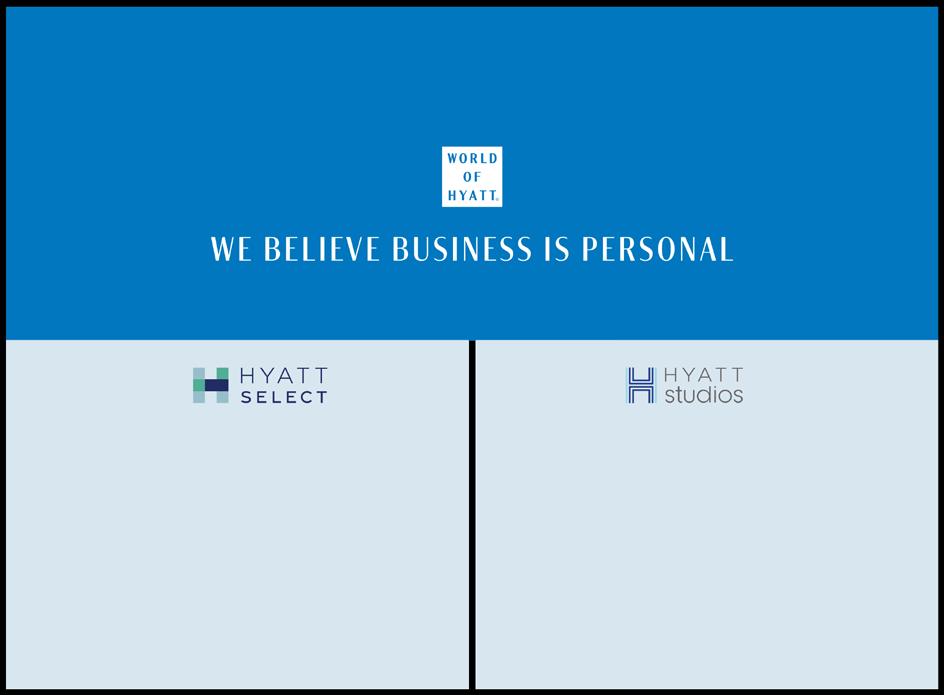






















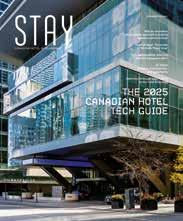

SUMMER 2025
Volume 5 Issue 3 staymagazine.ca
PUBLISHER
Big Picture Conferences
EDITOR-IN-CHIEF
Stacey Newman
stacey@staymagazine.ca
DIRECTOR OF SPONSORSHIP & ADVERTISING
Mike Egan
mike@staymagazine.ca
ART DIRECTION + DESIGN
Sonya Clarry + Brienne Lim
CONTRIBUTORS
Allan Lynch, Jim Byers, Emily Fisher, Stacey Newman
VISIT US ONLINE staymagazine.ca
Instagram staymagazine.ca
LinkedIn Stay Magazine
45 St. Clair Avenue West, Suite 1001 Toronto, ON M4V 1K9
© Copyright 2025 All rights reserved. No part of this magazine may be reproduced without written permission from Big Picture Conferences, the publisher.
STAY is published four times per year by Big Picture Conferences. For 27 years, Big Picture has been hosting the Canadian Hotel Investment Conference (CHIC) and other go to conferences and events for Canada’s hotel industry. For subscription inquiries, please visit staymagazine.ca/subscribe.
ISSN: 2816 7864
Key title: Stay
EDITORIAL ADVISORY BOARD
Mark Hope Senior VP, Development, Coast Hotels
Vito Curalli VP, Sales and Services, Hilton Supply Management
Rajan Taneja Director, Palm Holdings
Philippe Gadbois Chief Operating Officer, Atlific Hotels
Robin McLuskie Managing Director, Hotels, Colliers Hotels
Brian Leon President, Choice Hotels Canada
Brian Flood EVP and Practice Leader, Hospitality and Gaming, Cushman & Wakefield
Scott Richer VP, Real Estate and Development (Canada), Hyatt Hotels
Ed Khediguian VP, National Bank of Canada Franchise Finance
Bill Stone Co founder and Senior Advisor, Knightstone Hotel Group
Gunjan Kahlon RVP Development, Sonesta International Hotels
Judy Sparkes-Giannou Co Owner, Clayton Hospitality Inc.
Deborah Borotsik Senior VP, Beechwood Real Estate Advisors
Alan Perlis CEO, Knightstone Hotel Group
Alnoor Gulamani President, Bayview Hospitality Inc.
Christina Poon General Manager, Hotel W New York – Union Square
Phil Thompson Business Lawyer, Thompson Transaction Law
Sandra Kanegawa Owner, Heritage Inn Portfolio, X Dream


THIS ISSUE OF STAY MAGAZINE INTRODUCES THE INAUGURAL EDITION OF THE CANADIAN HOTEL TECH GUIDE, THE FIRST OF ITS KIND IN CANADA, DEVELOPED TO PROVIDE HOTEL OWNERS, OPERATORS AND INDUSTRY STAKEHOLDERS WITH A FUNCTIONAL OVERVIEW OF THE TECHNOLOGIES SHAPING HOTEL OPERATIONS IN CANADA.
Hotel technology is no longer a specialized category. It cuts across every aspect of hotel management—from staffing and service to pricing, guest communications and financial oversight. What once felt peripheral is now essential. But essential does not mean simple. As new platforms emerge, and as vendors expand their offerings, the need for straightforward, credible information has become increasingly clear.
This guide was created in response to that need. It is not a list of trends, nor is it a product showcase. Each entry was reviewed with a practical lens, with emphasis on Canadian availability, use cases and support infrastructure. Where possible, the content focuses on how tools function in real hotel environments, rather than how they’re marketed. The structure is organized by operational category—property management, revenue systems, guestroom technology, housekeeping, energy and more—to make the guide easy to consult and useful throughout the year. The guide is accompanied by a glossary of hotel technology terms.
In this issue, we also look at the effect of changing U.S. travel policies on Canadian group business. As border crossings become more uncertain for international delegates, Canadian hotels are seeing renewed interest from domestic conference planners, as well as opportunities to capture events that might otherwise have defaulted to U.S. cities. For many properties, this shift has implications for revenue pacing, service mix and cross departmental staffing—particularly in urban and regional convention markets.
Elsewhere, we examine the operational and reputational impact of Michelin’s new hotel rating system, the emergence of property level AI applications, and the evolving economics of food and beverage, event bookings, and visual storytelling.

Each article reflects the same editorial standard: current, evidence based reporting with direct relevance to hotel business outcomes.
Thank you to the operators, technology engineers, experts and partners who contributed their insight to this issue. And thank you to our readers—executive teams, managers, owners and investors—whose decisions continue to shape how hotels in Canada are run, staffed and experienced.
Please enjoy reading our SUMMER 2025 issue!

Stacey Newman Editor in chief
AND SUMMARIZED BY STACEY NEWMAN
The 2025 HotelTechIndex Market Leaders Report by Hotel Tech Report offers a high-level view of global technology trends shaping the hotel sector. The report’s findings reveal that artificial intelligence (AI) is no longer on the margins of hotel operations—it has become essential infrastructure.
Following is a summary of this comprehensive report based on thousands of hours reviewing software and researching technology trends by the team at Hotel Tech Report. The company was launched in 2017 by twin brothers Adam and Jordan Hollander, “with the goal of creating a research tool that would help hoteliers understand the potential that technology has to transform their businesses.”
For Canadian hoteliers, the message is clear. In an operating environment defined by complexity, the most resilient and profitable businesses will be those that align their systems, retrain their teams and invest in tools that make the entire operation smarter—not just faster. While the following outlines technology trends in the global hotel sector, you can find a directory of leading technology companies serving the Canadian hotel sector in the inaugural STAY Magazine Canadian Hotel Tech Guide, which begins on page 19 of this issue.
Key trends from the ‘2025 HotelTechIndex Market Leaders Report’
Persistent labour shortages and rising wages are pushing hotels to adopt automation as a core strategy. Tools like digital check in, staff collaboration platforms and maintenance scheduling software are helping smaller teams maintain service levels. Cross training is now the norm, with employees shifting between departments and relying on integrated tech systems to manage tasks across guest services, housekeeping and IT. Workflow automation is also enabling better preventive maintenance, reducing disruptions and downtime.
Four technologies are leading the digital guest experience: automated messaging, mobile check in, digital room service and upsell platforms. Mobile interactions allow guests to manage their stay with minimal friction, while AI driven messaging handles frequent requests and escalates complex needs to staff. Contactless tools—once health driven—are now standard. Hotels are also favouring mobile ordering systems that don’t require app downloads but integrate with inventory and pricing data, enhancing convenience and boosting revenue.
With booking windows shrinking and demand fluctuating, hoteliers are moving away from forecast based pricing. Real time rate management powered by AI is becoming essential. Hotels are dynamically adjusting prices across room types and channels while leveraging dashboards and analytics to refine strategy. Integrated systems linking availability, market intelligence and pricing are now seen as critical infrastructure.
Hotel marketers are leaning into AI powered CRM systems to segment audiences, personalize outreach and automate campaigns. Tools like chatbots, metasearch platforms and email automation are being integrated across marketing channels to maximize returns while reducing manual work. With marketing budgets under pressure, targeting and automation are no longer optional—they’re required.
With the average hotel running about 20 different apps, interoperability is crucial. The report urges properties to conduct annual tech audits to eliminate fragmentation, which often leads to inefficiencies. Tools with strong APIs, built in integrations and scalable infrastructure are being prioritized to reduce friction and future proof operations.
According to Hotel Tech Report, technology is no longer an add on to hotel operations—it is a structural necessity. In 2025, the industry is defined by automation, system integration and AI powered decision making. hoteltechreport.com


BY TROY TAYLOR, VP STRATEGIC PARTNERSHIPS AND MARKETING, FOODBUY CANADA
You know, in days gone by, “automation” meant the TV had a remote control and you didn’t have to get up to change the channel. Now look at us, we’re looking at robots, talking to AI, and digital concierges who are running entire hotels while we stand around holding our smartphones, wondering if we need to upgrade to facial recognition.
In 2025, technology in hospitality has evolved from a novelty to a strategic imperative. Innovation in automation, AI, and digital services is now central to driving revenue, enhancing guest satisfaction, improving operational efficiency, and supporting sustainability. For Canadian hotels competing in a global market, embracing these tools is no longer optional; it’s essential.
At the 2025 Hotel Association of Canada (HAC) Conference in Ottawa, it was revealed that 68 per cent of Canadian hotels continue to face labour shortages in key operational roles. Hotels simply can’t find enough people to make the beds and serve the toast. At the same time, guest expectations for faster, more personalized service are at an all time high. This dual pressure makes operational efficiency not just a competitive edge,
but a business necessity. I’m all for not having to wait in line to check in. We have all spent enough time at front desks being told, “Your room’s not ready yet, sir,” while being tired from the long trip. So, yes, maybe that mobile check in is not just for the tech savvy.
By leveraging automation, AI, and digital tools, hotels can reduce the burden on front line staff, eliminate repetitive tasks, and reallocate human resources to high value, guest facing roles. It’s not about staff replacement; It’s about guest enhancement.
Today’s travellers, especially Millennials and Gen Z, expect mobile first, seamless experiences. Over 70 per cent of travellers prefer hotels offering contactless check in/out and mobile key access. These guests manage their entire stay from their phones. They don’t want to call down for towels; they want to tap for towels, probably while they’re filming a TikTok about the towels. They expect to unlock their room with their phone like a Tom Cruise movie. For them, digital convenience isn’t a perk; it’s now a baseline expectation.
Mobile Check-In & Check-Out: Platforms like Mews and Operto allow guests to bypass the front desk, receive digital keys, and unlock rooms via Bluetooth enabled locks.
Digital Concierge & In-App Services: Guests want to request towels, book spa appointments, or order food without calling or queuing. In room tablets and mobile apps now offer these services, often integrated with messaging platforms like WhatsApp or Messenger.
AI-Powered Chatbots: Tools like Quicktext, Metaguest.AI, and HiJiffy provide 24/7 multilingual support, handling FAQs, booking changes, amenity requests, and even upselling services. A robot that can chat with me in 20 languages at 3 AM, when I’m jetlagged and want an extra pillow. It wasn’t long ago that guests had to submit a service request. Now we’ve got Metaguest.AI answering every question, and it works!
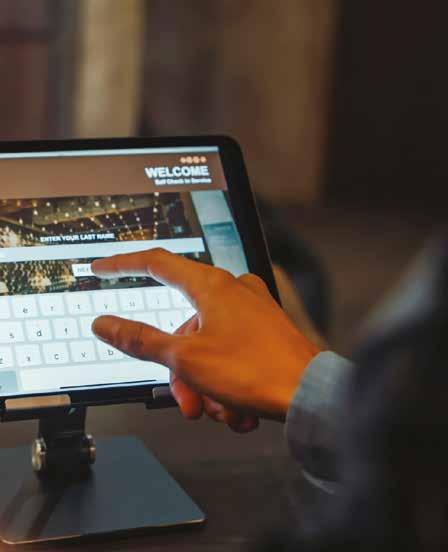
Digital convenience isn’t a perk; it’s now a baseline expectation.
A recent article in Capital Magazine highlighted that several Vancouver hotels piloting Metaguest.AI saw a 40 per cent reduction in front desk inquiries and a 20 per cent increase in guest satisfaction scores, with modest gains in upselling revenue. I guess the robot doesn’t roll its eyes at you when you ask for more coffee pods.
In the hotel sector, where demand can swing wildly between hockey tournaments, music festivals, and surprise snowstorms, pricing rooms has been part science, part guesswork. But artificial intelligence is taking the guesswork out of the equation and giving hoteliers a powerful new tool to boost revenues.
AI powered revenue management systems like Duetto, Cloudbeds, and IDeaS are now widely used across Canadian properties. These analyze real time data, everything from booking pace and competitor pricing to local events and weather forecasts, all to automatically adjust room rates by the hour, not just the day, week or even season.
Take, for example, you are a hotel in downtown Montreal. During the Formula 1 Grand Prix weekend, an AI system can detect a surge in international flight bookings and hotel searches weeks in advance. It can respond by
gradually increasing rates, maximizing revenue without scaring off early bookers resulting in an increase in RevPAR. Nice!
Some hotels are even integrating AI with loyalty programs to offer dynamic rewards based on real time occupancy and guest value.
We used to set rates with a spreadsheet and gut feelings. Now we’ve got a system that thinks faster and more intuitively than we ever can, and it’s paying off.
Turns out it’s not just the guests getting the digital treatment. Back of house is also getting tech upgrades. Inventory management is vital in the hospitality sector, especially in this volatile market. At Foodbuy, one of the companies we have been working with is Restock, based out of Quebec. Restock’s AI powered platform transforms foodservice operations by automating inventory, purchasing, and cost management processes.
Through direct integration with over 500 food distributors and compatibility with most POS systems, Restock automatically injects purchase data, updates product catalogues, and calculates costs. One key element is the ability to standardize recipes, with easy to source nutritional values, plus the ability to scan and load recipes right into the system. Wow!

AI now can watch over your food orders, update costs, predict when you’re going to run out of French fries, and basically is the right hand to the chef, freeing up time to focus on producing fantastic guest experiences. I remember when we just eyeballed it and hoped the truck would show up with enough potatoes. Now we’ve got dashboards, mobile stocktaking, and automated orders Star Trek, but for bacon burgers.
What was once a novelty is quickly becoming a necessity, as the hospitality industry grapples with labour shortages. Across Canada, hotels are deploying robots in a variety of roles, some visible, others quietly working behind the scenes.
At the forefront are concierge and delivery robots, like Relay by Savioke, which has become a familiar sight in hotel corridors. This compact, friendly robot autonomously delivers items like toiletries, snacks, and room service orders directly to guest rooms, freeing up staff for more complex tasks. Others greet guests in the lobby, answer questions about local attractions, and provide personalized recommendations—all with a smile (or at least a friendly LED expression).
Service robots from Sparc Technologies, and a Foodbuy partner, are helping deliver meals and clear tables. These robots navigate crowded dining spaces, reducing wait times and improving efficiency, especially during peak hours or staff shortages.
Housekeeping schedules are also now optimized by AI platforms, predictive maintenance tools flag issues before they become guest complaints, and cleaning robots handle repetitive floor care tasks. These robots aren’t flashy and are in their infancy. But they’re making a big impact on efficiency and consistency.
Leading edge hotels are taking a hybrid approach, blending robotic efficiency with human empathy. The goal isn’t to replace staff, but to support them, especially in a tight labour market.
Of course, not everyone is ready for this. Some still think all this technology is just a gimmick. According to HAC’s 2025 Business Intelligence Report, over 60 per cent of hoteliers feel their tech

investments are insufficient, and fewer than 10 per cent report having fully integrated tech ecosystems.
“I’ve been doing this for 40 years!” they say. We have seen what happens when you don’t keep up with your competitors next door. Your guests move on, your staff gets fed up, and you’re stuck wondering where everybody went.
Here’s my sage advice:
◉ Start with mobile and self service
◉ Optimize revenue with smart tools
◉ Pilot automation where ROI is clear
◉ Enhance personalization
◉ Track and refine daily: Staff training is a key hurdle, as nearly half of digital transformation failures stem from inadequate workforce preparation
Like it or not, the world has changed. Technology isn’t just a shiny new toy anymore, and between you and me, I’d rather my hotel be known as “that cool hotel that runs like clockwork” than “that place that still makes you sign a check in card with a pen on a string.”
Let the robot handle the repetitive stuff so your people can attend to the guests instead of drowning in spreadsheets. In the end, robots will not replace the human touch; after all, we are in the hospitality business. But they’re certainly lending a helping hand. And in an industry built on service, that might be the most human thing of all.
Those that embrace this shift will benefit from frictionless guest experiences, operational efficiency via automation and cloud based systems, and revenue growth through real time data and pricing intelligence.
Now, if you’ll excuse me, I’ve got to ask my AI assistant to book me a front row table and order up a pot of coffee while I’m at it.
Like it or not, the world has changed. Technology isn’t just a shiny new toy anymore.
ABOUT THE AUTHOR
Troy Taylor is a 30 year veteran in the foodservice, hospitality and retail sectors, where he has held senior roles with Labatt and PepsiCo. Taylor also helped serve the industry through Restaurants Canada, where he played a key role in helping oper ators survive through the pandemic, one of the most trying times in the history of the foodservice industry.
Troy currently manages Foodbuy Canada’s publications that provide actionable insights, purchasing solu tions and cost saving innovations to over 20,000 hospitality and food service operators across the coun try. Foodbuy Canada is a Compass Group Canada Company.
BY JIM BYERS
STAY Magazine senior correspondent and frequent traveller Jim Byers has stayed in some of the best, and most interesting, hotels in the world. Look for three of these profiles in every issue of STAY in 2025…
It’s my last morning on the shady, warm patio at Sunset at the Palms Resort in Negril, Jamaica. I’ve just ordered a “house” omelet with everything at the breakfast buffet and am looking around and taking photos of the pretty tropical flowers and reach to the sky palm trees.
Suddenly, a young woman who was working at the omelet station dashes

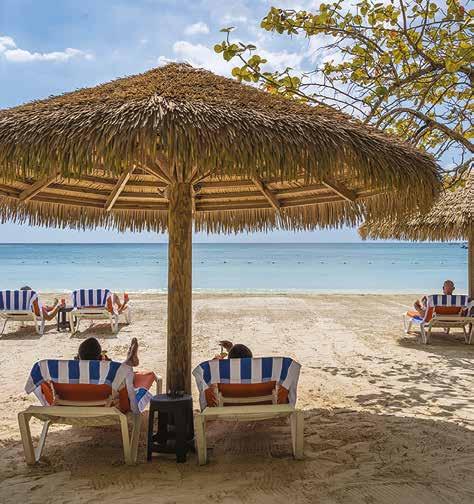
over to my table and hands me my breakfast, thus allowing me to avoid a strenuous 10 metre walk to get my food.
“You didn’t have to do that,” I say. “I was just going to come over.”
She just smiles and turns away.
A second or two later, another young woman comes by to offer me coffee.
“Yes, please,” I say.
“With milk?”
“Yes, please, “I answer. “LOTS of milk.”
She laughs.
“Oh, would you like me to warm it up for you?”
“No, I’m okay. But thanks.”
“All right. But next time I’ll warm it up for you.”
I’ll long remember the warm, calm waters at the uncrowded beach club across the road from the resort. I doubt I’ll ever forget my room and the patio, with the sounds of tiny black and yellow and pale brown birds and crickets and the soft rustling of a Jamaican breeze in the towering, deep green trees.
I know I’ll never forget the warmth of the staff.
There was Cornelius, who was always asking me how things were going, as if I could have a complaint in the world at this place. There was Evatt Bloomfield, the general manager, who used to work at the Sheraton Centre Toronto and regaled me with stories of his various jobs around the Caribbean over the years.
There was also Jacob the gardener, a fellow close to my age who has probably swept more sidewalks and hacked at more overgrown trees than any human being should have to do in their lifetime. And Kenesha, who served me an al fresco lunch and chatted with me about family and gave me a huge hug after I finished my meal.
But I’d be remiss if I didn’t mention two resident staff who made my
stay extra special by eating almost every plant in sight. As a former sportswriter at the Toronto Star, I had the pleasure of meeting many GOATs, including Michael Jordan and Wayne Gretzky. But, until my trip to Sunset at the Palms, I’d never actually dined with two actual goats.
One of the memorable experiences the resort offers is called “Picnic with Betty,” in which a guest or guests are seated at a table in a small, open field with formal dinnerware and a tablecloth, and a frisky goat named Betty.
I was the recipient of a double goat treat, as seven year old Betty was joined by cuddly, soft, five week old Billy, one of her offspring that also is lucky enough to live at this all inclusive, adults only resort (with Billy being an exception). I was able to order off a special menu for my picnic and chose blackened salmon and fries with a salad. The salmon and salad were quite good. A bottle of sparkling wine, which I did not finish, is included in your lunch.
Another culinary highlight of the trip was the Chef’s Showcase, held in the Lotus Leaf dining rooms. Resort chefs introduce themselves before the meal and talk about what they’ll be cooking under the guidance of head chef Michael Barnett, who once worked in Austria and likes to use European techniques mixed with traditional Jamaican dishes.
Just outside Lotus Leaf is the open air Irie Martini Bar in the lobby, where a talented piano player and singer named Paul belts out a variety of tunes and encourages sing alongs several days a week. When I was there, he was playing tunes such as “Sweet Caroline,” “Don’t Stop Believin’” and “With a Little Help from My Friends.”
In addition to the martini bar, there’s a nice cocktail bar by the pool, which also has swim up seats. There’s a generously sized hot tub near the pool.
The resort is not on the ocean, but the hotel has a beach club on a fine stretch of sand on Bloody Bay (clearly not a name created by the local tourism board) that’s less than a five minute walk away, just across a two lane road that’s easy to navigate with the help of the resort’s crossing guard. (You’d have to walk that far to get to the beach at many oceanfront resorts, one of the hotel workers told me over dinner, and it’s a valid point.)
There were a few people selling trinkets on the beach, but it was very quiet, with comfy lounge chairs for both sun and shade and a few thatched roof umbrellas. Unlike some resorts, there was no pounding music from the poolside drifting down over the sand, and thank goodness, no choreographed dancing.
The resort offers free pedal boats, as well as Hobie Wave sailboats, kayaks, stand up paddleboards and snorkelling gear.
One of the best things here is the lush and luxuriant grounds, which go on for quite some distance and include brilliant pink bougainvillea and deep red/ green/yellow croton, as well as dozens and dozens of graceful palm trees.
There are 85 rooms at Sunset at the Palms, spread across 10 acres. Units come in three types: Treetop Standard, Treetop Deluxe and Treetop Suites.
All rooms are built above ground, with two units to a building. The living area walls don’t intersect, so you won’t hear your neighbour’s iPhone ringing or hear an alarm, not that anyone would want to set one here.

My unit, 507, was quite large, and had a comfy king bed, a good sized bathroom, lots of closet space, a mini fridge and a tea kettle with tea bags and pretty good instant coffee. The room featured big, wooden shutters you could open to get a breeze, plus a ceiling fan and air conditioning.
The best part for my money was the good sized balcony/lanai, with a small table and chairs and a comfortable, cushiony sofa in one corner that was ideal for reading or contemplating nature. I already miss the view of the deep green foliage and robin’s egg blue sky peeking through the trees.
The resort also has an on site spa.
If you feel like exploring, the resort is happy to take you to Negril to have a drink or a bite to eat, and to watch the famous cliff divers. You can also do Half Moon Bay boat cruises, do a gentle rafting trip on the Martha Brae River, visit the Appleton Rum estate, or take trips to nearby waterfalls.
thepalmsjamaica.com
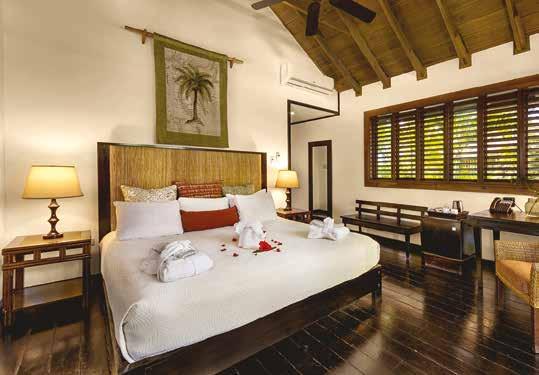
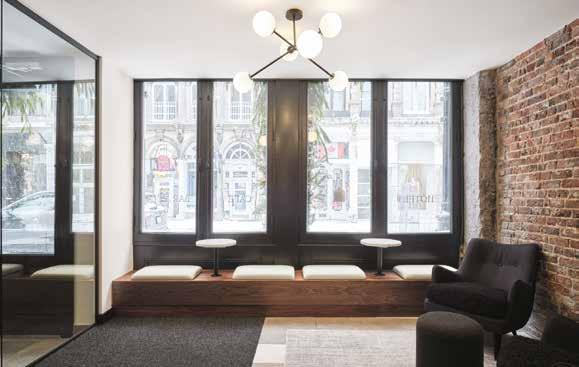
I checked my Apple Maps. This seemed to be the right place. But where was my hotel?
My wife and I were booked for two nights at Le Petit Hôtel Old Montreal Notre Dame. Our Uber driver stopped on rue Notre Dame, just steps from Notre Dame Basilica, but I didn’t see our hotel. I know enough French to understand Le Petit means small hotel, but I literally couldn’t see it.
Finally, I spotted a small sign in a window of a building on the north side of the street that said, “Petit Hôtel.”
We got our carry on bags and pushed the door open. But, instead of a hotel lobby, we have stepped into a coffee shop. There was a shiny

espresso machine at the end of a long counter, and I could smell the aroma of fresh brewed coffee.
“Sorry,” I said to a young woman behind the counter. “Can you tell me where I’d find Le Petit Hôtel?”
“This is it,” a nice young woman behind the counter answered. She waited a split second. “Don’t worry, it happens all the time.”
It turns out that the lobby of this gem of a property in Old Montreal is both a coffee shop AND a hotel check in counter. It’s a great feature, but you don’t have to be a connoisseur of cappuccino to appreciate this stylish, super intimate 17 room hotel in the heart of Old Montreal.
Located a stone’s throw from Notre Dame Basilica, the hotel is part of the Gray Collection, which includes the swanky and superbly designed William Gray Hotel, Auberge du Vieux Port and other boutique properties in the old part of the city. They also own a handful of restaurants.
They’re all run by the Antonopoulos Group, which was founded by brothers Costa and Tony Antonopoulos shortly after they arrived in Canada from Greece. Their holdings gradually expanded, and Costa and his children
created the Gray Collection brand in 2022.
Le Petit Hôtel Old Montreal Notre Dame is their latest offering. Rooms feature exposed brick walls from a historic building that formerly housed shops and a small factory.
“We painstakingly cleaned the bricks one by one,” an employee told me on a tour.
Some rooms face the street, but others are tucked towards the back of the building. One room we spotted at the back had a particularly wide and long entrance and more space than ours did, but didn’t have the view.
Our fourth floor room (rooms come in “small, “medium,” and “large” and range 220 to 375 square feet) had large windows looking out on rue Notre Dame. There was no closet, but we had plenty of hangers in an open storage area, as well as a mini fridge, a large screen TV, and a lovely Bluetooth speaker that I used briefly to crank up a little Leonard Cohen.
The small bathroom was well arranged and featured high end Le Labo bath products. The shower features four or five nozzles arranged vertically. The hot water came on immediately, and the shower has considerable oomph, which is both fabulous and rare. Just watch where you aim those nozzles.
While there isn’t space for a large desk in this boutique hotel, it offers several inviting alternatives for getting work done. The breakfast room is spacious and comfortable. There’s also a cozy lobby area with outlets available—plus compli mentary lattes to keep you going.
This being Montreal, breakfast is included in your bill. In addition to
the great java, guests enjoy Montreal bagels, fresh fruit, yogurt, deli meats and other treats in the morning. You can order a glass of wine in the lobby of the hotel at night.
The aesthetic is very European, and it’s understandable that they don’t want to cram too much into smallish rooms. The drinking glasses were petite, adding a charming touch, and the bathroom waste baskets compact—for keeping things tidy without taking up much room.
The warm staff, the cool design and the superb location make this a terrific option for a couple of nights in one of the world’s great cities.
“One reason we love doing work in Old Montreal is you have these old buildings,” Dimitri Antonopoulos, the unassuming president of the Gray Collection, tells me. “You take advantage of the natural beauty, the brick walls, the stone walls. We try to mix that old feeling with more of a modern feel. We only have one small painting per room as we don’t want the design to take away from the building’s natural beauty.”
The family also prefers smaller, boutique properties.
“I tell my team that at the end of the day, you have the advantage of saying ‘hello, good morning, good afternoon,’ to every guest and to ask how their day was. That’s what people are looking for.”
Antonopoulos tells me he’s not sure where the lobby coffee bar idea came from, but that he might have seen it at a hotel in New York City.
“I love coffee. I used to love Nespresso machines (in a hotel room), but now that doesn’t cut it for me,” he says with a laugh. “So, I like the idea of a coffee bar in the lobby.”
Not only is it a nice feature for guests, but it also helps bring nearby workers or residents into the hotel and creates a local connection.
Given potential surprises and building code issues, it’s not always easy to build a hotel in Old Montreal. But the family is building another inn just down the street, a few metres away. They also own Hotel Metcalfe in Ottawa.
Antonopoulos says that he wouldn’t rule out other cities.
“We might do more in Ottawa, perhaps Quebec City. Toronto has very expensive real estate. I wouldn’t say we’re close to any opportunities there right now.”
I ask Antonopoulos who their target audience is. “At first we thought it was a younger market,” he responds. “But we soon realized it’s not a matter of age. It’s more about what the customer is looking for.
“I think intimacy is the key. It’s that extra level of personalized service. It’s not like we take the staff aside and say, ‘Okay, here’s your clients today; say their names three times.’ It’s more of a natural, unscripted type of service.
“Because we’re so small, we definitely want our staff to be extra welcoming and make sure they talk to everybody. That’s what people come back for.

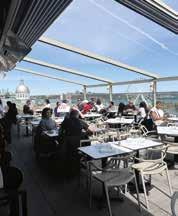
“After we had been open a while (the hotel opened in 2024), we searched online comments. What kept coming up was ‘I’ve never had this kind of service.’ I’m not saying this to brag, but that’s what people are excited about. They like the coffee and the rooms and the showers and the breakfast, but what kept coming up in their comment was the service.”
The Gray Collection is a decidedly family affair. Three of Dimitri’s sisters are involved in the business and handle sales, guest experience, marketing and other tasks. Their Dad, Costa, also remains involved in the business and is often seen poking his head into the company’s restaurants and hotels.
A new courthouse is being built next door to the hotel, so there will be some construction noise for a few more months, or perhaps longer. But I didn’t hear any hammering until later in the morning, and workers seemingly put down their tools by 5 p.m. or so.
Le Petit Hôtel Old Montreal Notre Dame guests can use the gym and spa at the William Gray Hotel.
There’s no on site restaurant, but there are tons of places to eat a short walk away. We had a lovely dinner at the Gray Collection’s Gaspar restaurant one night, including nice cocktails, a small but perfect order of duck confit. The other night we dined on the patio at Terrasse, the stunning rooftop restaurant at their William Gray Hotel, where we enjoyed very good steak frites and tender sea bass.
There’s free coffee in the lobby, but a guest can order a Nespresso machine from the front desk if they wish one in their room.
le-petit-hotel.com


Sometimes it takes a while to appreciate the nuances of a hotel or resort. But other times you take one look and say, “Holy cow.”
My wife and I were recently invited to check out the South Beach Motel in Southampton, Ontario, which opened in mid spring. We first visited the town maybe 30 years ago, renting a home near the beach that was decorated in a design you might call “old person casual” and festooned with photos of such Toronto Blue Jays as Ernie Whitt and Buck Martinez.
I figured things in Southampton had changed a bit over three decades, but I wasn’t prepared for a dashing, vibrant renovated motel that made this California raised travel guy feel like he was back in Santa Monica or the Florida version of South Beach.
The first thing that grabbed me was the brilliant yellow and white vertical stripes on the front wall of the building; a bold, welcoming dash of colour.
Our room was a corner affair on the ground floor, Room 4, with taupe walls, a white sofa, two comfy white chairs for relaxing, and a round, white dining table with four chairs. Keeping with the theme, there were also several yellow, round end tables and an ottoman. The kitchen had snazzy, taupe and white striped wallpaper and was fitted out with a retro looking fridge, Nespresso coffee maker, fashionable toaster, and a dishwasher. The bathroom had a large, super deep tub that some might have trouble getting out of, but it was great for soaking. There was also a nice patio out back and a good sized bedroom with a king bed.
There were colourful, retro looking photos of women in modest swimsuits on the wall, which added to the California Florida vibe.
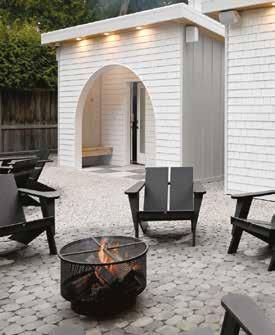
The design ideas came from Twenty Two Twelve, a Toronto based firm that also designed Hotel Julie in Stratford.
“We weren’t quite sure about those stripes when our designer showed them to us, but we love them,” co owner Samantha Butte naar told me during a media visit in mid spring.
The South Beach Motel is the second Southampton renovation by local residents Samantha and Dane Buttenaar. Their first was literally a few blocks up the road, called the Beach Motel.
Samantha says she and Dan were living in the area, where Dan had a landscaping job. Samantha, who worked at Blue Mountain in tour ism and held other travel related jobs, was laid off from her job as a mental health counsellor, and the two began travelling. They checked out beach resorts, casual motels, overwater bungalows, and just about everything in between.
“I fell in love with the idea of motels,” Samantha says. “I love how people get out and mingle in the courtyard or maybe sit on a chair outside their room and chat with other guests. You don’t get that in a big hotel with indoor hallways.”
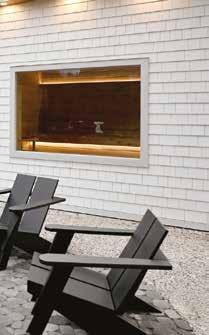
(As much as I like to consider myself a hotel connoisseur, I had never considered the social aspect of a motel.)
The Buttenaars slowly got into real estate, buying older homes and fixing them up for resale. Then came a chance a few years ago to buy the old 1950s era Beach Motel, which they jumped at.
“It was a mess,” Samantha explains. “The lobby area basically imploded on us. We had to learn about construction,” she tells me. “Dane was really in there. He’d come home every day covered in dust. I don’t think anyone at the worksite had any idea he was the motel owner.”
Being hit by COVID 19 was generally a disaster for the tourism industry, but city residents began flocking to nearby resorts and hotels where they could be outside and safely distant from indoor germs. A place like the Beach Motel in a beach town like Southampton made perfect sense, and visitors began to arrive in steady numbers.
The opportunity later came up to buy the South Beach Motel.
“This one needed a lot less work,” Dane told me. “It’s super solid. The reason we bought it is because of the bones.”
The Beach Motel, which has cool basket chairs hung from the ceiling like a swing, has parking directly in front of the units. At South Beach, the parking is tucked away to the side.
Both buildings are two storey affairs. All ground floor rooms at the South Beach Motel open onto a large patio with yellow and white loungers, striped umbrellas and picnic tables for more guest mingling. There’s also a cornhole game and the remnants of an old swimming pool they’re deciding what do with. Off to one side is a covered area with a sink, a microwave (there are no microwaves in the rooms as Samantha and Dave didn’t like the look) and a BBQ.
Around the corner is a small but pretty spot with lots of sweet smelling wood, a fire pit and wooden chairs for relaxing. They hope to soon add two cold plunge pools, which will be nice for summer.
The original South Beach Motel had 18 keys, but the Buttenaars cut that down to 12 to create larger rooms for today’s lifestyle. The rooms come in a variety of sizes, with bachelor suites, family suites, honeymoon suites, and double suites.
Southampton is about a three hour drive from Toronto. The last couple of hours take you on a relaxing route past lovely farmland and attractive small towns.
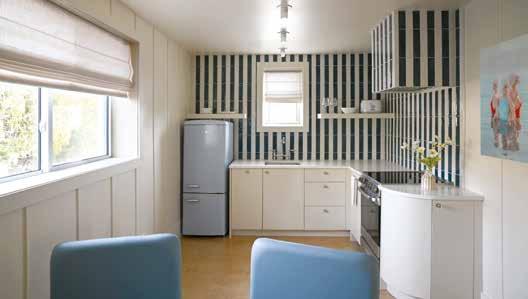
“South Beach is unlike anything else in the area,” Dane says. “It takes everything guests love about The Beach Motel—the location, the elevated touches and custom design, the escapism—and combines it with larger rooms and more family fo cused stays. Add to that a totally retro design, and you get South Beach: a little slice of Miami right here in Southwestern Ontario.”
The lobby for the South Beach Motel is up the road a few blocks at The Beach Motel. The latter is also home to their new restaurant, Mirasol, which serves Spanish tapas and, based on our one night test, is an exquisite addition to the Lake Huron shoreline food scene.
The bright, open restaurant will offer local pastries in the morning, including local cinnamon rolls the size of a hockey goalie’s blocker, as well as coffee, yogurt and other goodies.
The Beach Motel also has a second floor patio that would be great for an early evening cocktail or a local beer. And they can set you up for an on site spa treatment.
“So many people come here year after year,” Samantha tells me over a cocktail at Mirasol. “They might not have a cottage, but they want to come for a week or two.
The South Beach Motel is a short walk to a shopping strip with a Tim Horton’s, Circle K, Rexall pharmacy and a Subway outlet. The Beach Motel is closer to downtown shops and restaurants, including The Walker House.
Both motels are just a short walk from Southampton Beach, which is a fine stretch of sand with fabulous sunsets.
thebeachmotel.ca




BY EMILY FISHER & STACEY NEWMAN

This special report, researched and developed by STAY Magazine, provides a detailed overview of the hotel technology ecosystem in Canada for 2025. It highlights the companies, platforms, and tools currently supporting hotel operations, guest experience, communications, and revenue management across the country.
Organized by function—from property management systems to guest room controls, payment processing, and AV/event tech—each section includes Canadianspecific context where applicable. Operators can use this guide to compare offerings, identify relevant technologies, and assess integration opportunities based on their property’s needs.
A glossary of key terms follows to support clarity and help readers navigate the evolving language of hotel tech.
AGILYSYS INC.
PRIMARY OFFERINGS: PMS, POS AGILYSYS.COM
CLOUDBEDS
DSC HOTEL SYSTEMS
DSO HOTELS 8.0
PRIMARY OFFERINGS: PMS CLOUDBEDS.COM
PRIMARY OFFERINGS: CLOUD-BASED PMS DSCSOFTWARE.CA
PRIMARY OFFERINGS: PMS DSOSOFTWARE.COM
GRACESOFT / EASY INNKEEPING
HOTEL EVISION CANADA LTD.
HOTELLO (BY D-EDGE)
PRIMARY OFFERINGS: PMS GRACESOFT.COM
PRIMARY OFFERINGS: TECHNOLOGY INNOVATION, MANAGEMENT & HARDWARE SOLUTIONS EVISION.CA
PRIMARY OFFERINGS: PMS HOTELLO.COM
INFOR PRIMARY OFFERINGS: PMS INFOR.COM
Agilysys Inc. supports Canadian hotel businesses with a cloud-native platform including property management, point-of-sale, and spa management systems. With offices in Toronto and Markham, it provides local sales and technical support, including for its ResortSuite PMS and Book4Time spa solutions.
Cloudbeds provides an all-in-one platform for Canadian hotels that includes PMS, booking engine, guest messaging, and revenue tools.
DSC Hotel Systems offers a cloud-based PMS for Canadian hotels, known for fast setup, ease of use, and reliable performance. It integrates with Celayix for staff scheduling and labour compliance.
DSO Hotels 8.0 provides an all-in-one hotel management and billing system that supports Canadian hotels with reservations, check-in/out, POS integration, housekeeping, and reporting.
GraceSoft’s Easy InnKeeping is a cloud-based PMS for small to mid-sized hotels, supporting reservations, housekeeping, and guest communication.
Hotel eVision provides PMS, point-of-sale, and custom software to streamline operations and guest services for Canadian hotels.
Hotello delivers a cloud-based PMS for Canadian independent and mid-sized hotels, offering tools for operations, communication, and revenue optimization.
Infor offers its Hospitality Management System (HMS), along with event automation and revenue tools hosted on Amazon Web Services (AWS), for Canadian hotel operations.
INNQUEST CANADA
PRIMARY OFFERINGS: PMS INNQUEST.COM
INNSOURCE SOLUTIONS INC.
PRIMARY OFFERINGS: PMS INNSOURCESOLUTIONS.COM
InnQuest Canada offers roommaster PMS, including booking, OTA management, and guest communication tools, tailored for Canadian independent hotels.
InnSource Solutions offers the Inn Control PMS for Canadian hotels, with modules for dining, housekeeping, revenue management, and event bookings.
JONAS SOFTWARE
PRIMARY OFFERINGS: INTEGRATED HOTEL MANAGEMENT PLATFORM
JONASSOFTWARE.COM
MAESTRO PMS
PRIMARY OFFERINGS: INTEGRATED PMS MAESTROPMS.COM
MEWS
PRIMARY OFFERINGS: CLOUD-BASED PMS MEWS.COM
ORACLE
PRIMARY OFFERINGS: PMS AND POS ORACLE.COM
ROOMKEYPMS
RMS
ROOMRACCOON
PRIMARY OFFERINGS: CLOUD-BASED PMS
ROOMKEYPMS.COM
PRIMARY OFFERINGS: PMS
RMSCLOUD.COM
PRIMARY OFFERINGS: CLOUD-BASED HOTEL MANAGEMENT SYSTEM
ROOMRACCOON.COM
SKYTOUCH TECHNOLOGY
PRIMARY OFFERINGS: CLOUD-BASED PMS, RATE MANAGEMENT
SKYTOUCHTECHNOLOGY.COM
SMART HOTEL SOFTWARE
PRIMARY OFFERINGS: ON-PREMISE PMS
SMARTHOTELSOFTWARE.COM
Jonas Software offers an all-in-one platform combining PMS, point-of-sale, spa, and marketing tools for Canadian hotels, with a unified guest data system.
Maestro PMS offers a multi-module system for front desk, spa, sales, and mobile tools, with deployment flexibility and 24/7 support.
Mews offers a cloud-native PMS for Canadian hotels, including mobile check-in, payment processing, and staff optimization tools.
Oracle supports Canadian hotels with OPERA Cloud PMS and Simphony point-of-sale to enhance guest and operational workflows.
RoomKeyPMS provides booking, pricing, and contactless check-in tools in a secure, scalable cloud platform.
RMS Cloud offers PMS tools for reservations, pricing, housekeeping, and guest communication in Canadian hotels.
RoomRaccoon combines PMS, channel manager, payment tools, and guest messaging for all-in-one hotel management.
SkyTouch offers a cloud-based PMS with mobile access and customizable features for hotel operations.
Smart Hotel Software provides a locally hosted PMS with integration to accounting tools like Sage 50 and QuickBooks.
WEBREZPRO
PRIMARY OFFERINGS: CLOUD-BASED PMS
WEBREZPRO.COM
WebRezPro is a Canadian-developed cloud PMS serving hundreds of hotels across the country. It offers centralized tools for reservations, front desk, housekeeping, and online distribution, with strong adoption among independent and mid-sized properties.
AGILYSYS INC.
PRIMARY OFFERINGS: PMS, POS AGILYSYS.COM
HOTEL EVISION CANADA LTD.
JONAS SOFTWARE
PRIMARY OFFERINGS: TECHNOLOGY INNOVATION, MANAGEMENT & HARDWARE SOLUTIONS EVISION.CA
Agilysys Inc. supports Canadian hotel businesses with a cloud-native platform including property management, POS, and spa management systems. With offices in Toronto and Markham, it provides local sales and technical support, including for its ResortSuite PMS and Book4Time spa solutions.
LIGHTSPEED COMMERCE
PRIMARY OFFERINGS: INTEGRATED HOTEL MANAGEMENT PLATFORM JONASSOFTWARE.COM
Hotel eVision provides PMS, POS, and custom software to streamline operations and guest services for Canadian hotels.
MAITRE’D BY POSERA POS
PRIMARY OFFERINGS: INTEGRATED HOTEL RESTAURANT POS SYSTEMS LIGHTSPEEDHQ.COM
Jonas Software offers an all-in-one platform combining PMS, POS, spa, and marketing tools for Canadian hotels, with a unified guest data system.
MATRIX INTEGRATED SOLUTIONS LTD.
PRIMARY OFFERINGS: POS SYSTEMS FOR HOSPITALITY MAITREDPOS.COM
Lightspeed provides POS systems that connect hotel restaurants to PMS platforms and offer real-time analytics and instant payouts.
ORACLE
PROFITEK POS SOLUTIONS
PRIMARY OFFERINGS: HOSPITALITY TECHNOLOGY SOLUTIONS MATRIXPOS.COM
Maitre’D provides modular POS systems integrated with hotel PMS for centralized billing, cloud reporting, and mobile ordering.
Matrix provides POS, liquor control, inventory, and security systems to enhance operational control in Canadian hotel environments.
PRIMARY OFFERINGS: PMS AND POS ORACLE.COM
Oracle supports Canadian hotels with OPERA Cloud PMS and Simphony POS to enhance guest and operational workflows.
PRIMARY OFFERINGS: POS PROFITEK.COM
Profitek delivers POS systems with billing, inventory, and customer management tools tailored for Canadian hotels.
ALTUS GROUP
PRIMARY OFFERINGS: PROPERTY TAX ADVISORY
ALTUSGROUP.COM
COSTAR GROUP
PRIMARY OFFERINGS: MARKET INTELLIGENCE & BENCHMARKING TOOLS
COSTARGROUP.COM
Altus Group offers Canadian hotels property tax advisory, valuation, cost management, and analytics services. It helps reduce tax liabilities and improve investment decisions with tools like ARGUS Enterprise and Altus Data Studio.
CoStar Group supports Canadian hotels with data on average daily rate occupancy, RevPAR, and market trends through its STR division.
DUETTO
FAIRMAS GMBH
PRIMARY OFFERINGS: CLOUD-BASED RMS
DUETTOCLOUD.COM
IDEAS
PRIMARY OFFERINGS: FINANCIAL & BUSINESS INTELLIGENCE FAIRMAS.COM
Duetto offers Canadian hotels an RMS platform that uses real-time data and AI to optimize pricing, forecasting, and group business.
LODGIQ
PRIMARY OFFERINGS: RMS AND SERVICES IDEAS.COM
Fairmas offers a cloud-based platform for budgeting, forecasting, and revenue planning, helping Canadian hotels improve financial performance.
MYDIGITALOFFICE / OTELIER
PRIMARY OFFERINGS: COMMERCIAL STRATEGY & REVENUE OPTIMIZATION PLATFORMS
LODGIQ.COM
IDeaS provides automated, cloud-based revenue management tools that help Canadian hotels optimize pricing and forecasting.
LodgIQ delivers AI-powered tools for pricing, forecasting, and market insights to help Canadian hotels optimize revenue.
PRIMARY OFFERINGS: HOTEL PERFORMANCE MANAGEMENT AND BACK-OFFICE AUTOMATION OTELIER.IO
Otelier (formerly MyDigitalOffice) provides budgeting, audits, and reporting tools to improve financial oversight in Canadian hotels.
RATEGAIN TECHNOLOGIES INC.
PRIMARY OFFERINGS: AI-POWERED SAAS SOLUTIONS RATEGAIN.COM
RateGain offers demand forecasting, rate management, and distribution tools to improve hotel profitability.


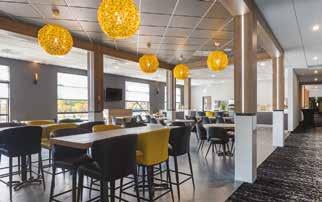



At Quality® brand hotels, our guests want real value for their hard-earned dollars. They need to know they’ll get their money’s worth so they can relax and focus on the people and experiences they came for. And in Canada, we’re delivering!
Get your money’s worth. It’s not just a promise to our guests; it’s a promise to our franchisees, too. The Quality brand delivers great performance and also provides owners with a great opportunity to enhance property value and strengthen market positioning. Plus, the brand’s flexible product extensions fit most building types and locations.
The Quality brand is all about delivering on the value that both guests and hotel owners need.




ASKVIOLET.AI
PRIMARY OFFERINGS: AI-POWERED VOICE CONCIERGE AND CALLHANDLING
ASKVIOLET.AI
AXXESS INDUSTRIES INC.
PRIMARY OFFERINGS: SMART GUEST ROOM CONTROL SYSTEMS AXXIND.COM
BITTEL
PRIMARY OFFERINGS: IN-ROOM GUEST TECHNOLOGY & AMENITIES
BITTELAMERICAS.COM
CIRQPLUS
ENSEO
GUESTTEK INTERACTIVE ENTERTAINMENT
PRIMARY OFFERINGS: SMART ROOM & ENERGY MANAGEMENT SYSTEMS CIRQPLUS.COM
PRIMARY OFFERINGS: INTEGRATED HOSPITALITY TECHNOLOGY ENSEO.COM
PRIMARY OFFERINGS: GUEST INTERNET & INROOM ENTERTAINMENT SOLUTIONS GUESTTEK.COM
HOTEL TECHNOLOGIES
PRIMARY OFFERINGS: IN-ROOM ELECTRONICS HOTELTECHNOLOGIES.COM
INNSPIRE
PRIMARY OFFERINGS: GUEST EXPERIENCE & AUTOMATION PLATFORM INNSPIRE.COM
AskViolet.ai offers an AI-driven voice concierge platform that manages hotel guest calls, handles requests, answers FAQs, and supports upselling in over 160 languages. It integrates with PMS and PBX systems to reduce front-desk load and improve service.
Axxess Industries Inc. provides wireless guest room controls, including keypads, do-notdisturb panels, and sensors designed and built in North America for cable-free installation in hotels.
Bittel provides multifunction phones and charging stations that combine audio, communication, and wireless charging for guest rooms.
CirqPlus offers an AI-driven modular hub that integrates climate, lighting, and entertainment systems to reduce hotel energy use and enhance guest comfort.
Enseo provides Canadian hotels with an in-room platform offering live TV, streaming apps, Wi-Fi, room controls, and employee safety tools.
GuestTek’s OneView platform delivers internet, IPTV, voice, and mobile services for Canadian hotels, supported by multilingual, 24/7 support.
Hotel Technologies offers iHome and Timex-branded alarm clocks, charging stations, and Bluetooth audio systems for Canadian hotel rooms.
InnSpire provides Canadian hotels with mobile check-in, smart room controls, and backend automation through its InnSpire.ONE platform.
LEGRAND
PRIMARY OFFERINGS: GUEST ROOM MANAGEMENT SYSTEMS (GRMS) LEGRAND.CA
Legrand supplies integrated lighting, shading, and energy management systems for Canadian hotel guest rooms and public spaces.
LG ELECTRONICS CANADA INC.
PRIMARY OFFERINGS: IN-ROOM ENTERTAINMENT & DISPLAY SOLUTIONS
LG.COM/CA
MODIO GUEST ROOM ACOUSTIC CONTROL
PRIMARY OFFERINGS: GUESTROOM ACOUSTICS AND NOISE CONTROL SOLUTIONS
MODIO.AUDIO
NOMADIX
ONSTREAM BY DISH BUSINESS
PRIMARY OFFERINGS: GUEST WI-FI & CONNECTIVITY SOLUTIONS
NOMADIX.COM
PRIMARY OFFERINGS: GUEST ENTERTAINMENT & DIGITAL ENGAGEMENT SOLUTIONS
DISHBUSINESS.COM
OPERTO GUEST TECHNOLOGIES
PC MUSIC
PHILIPS CANADA
PRIMARY OFFERINGS: CONTACTLESS GUEST EXPERIENCES & PMS INTEGRATION
OPERTO.COM
PRIMARY OFFERINGS: IN-ROOM ENTERTAINMENT & LICENSED BACKGROUND MUSIC
PCMUSIC.COM
PRIMARY OFFERINGS: HOTEL INFRASTRUCTURE & GUEST EXPERIENCE SOLUTIONS
PHILIPS.CA
SAMSUNG DISPLAY SOLUTIONS
PRIMARY OFFERINGS: GUESTROOM TECHNOLOGY & ENTERTAINMENT SYSTEMS
SAMSUNG.COM
SÉURA INC.
LG offers hospitality TVs, signage, and HVAC products supported by the Concierge Advantage program for Canadian hotels.
PRIMARY OFFERINGS: LUXURIOUS & FUNCTIONAL MIRROR SOLUTIONS
SEURA.COM
Modio provides Canadian hotels with sound-masking devices to reduce noise disturbances and improve sleep quality.
Nomadix supplies Wi-Fi, voice, and in-room entertainment solutions tailored to hotel needs across Canada.
OnStream offers Canadian hotels a guest platform with streaming, live TV, casting, and interactive content tools.
Operto provides contactless access, smart locks, and digital guest messaging integrated with hotel systems.
PC Music creates SOCAN-compliant soundtracks and playlists to reinforce hotel brand identity and atmosphere.
Philips offers MediaSuite TVs, LED lighting, and professional displays managed via CMND & Control for Canadian hotels.
Samsung offers QLED hospitality TVs, signage, and content management systems for in-room and public areas.
Séura offers lighted, framed, and TV mirrors with vanishing displays to enhance hotel room aesthetics.
AGILYSYS INC.
PRIMARY OFFERINGS: PMS, POS
AGILYSYS.COM
Agilysys Inc. supports Canadian hotel businesses with a cloud-native platform including property management, POS, and spa management systems. With offices in Toronto and Markham, it provides local sales and technical support, including for its ResortSuite PMS and Book4Time spa solutions.
ARIANE SYSTEMS NORTH AMERICA
PRIMARY OFFERINGS: SELF-CHECK-IN AND CHECK-OUT SOLUTIONS
ARIANE.COM
ASKVIOLET.AI
PRIMARY OFFERINGS: AI-POWERED VOICE CONCIERGE AND CALLHANDLING
ASKVIOLET.AI
ASSA ABLOY GLOBAL SOLUTIONS
PRIMARY OFFERINGS: ELECTRONIC ACCESS CONTROL, MOBILE KEY SECURITY
ASSAABLOYGLOBALSOLUTIONS.COM/EN
Ariane Systems North America provides Canadian hotels with kiosk, mobile, and web-based self-check-in and check-out solutions. Its systems integrate with major PMS, lock, and payment providers, and are supported by installation and project services.
DORMAKABA CANADA INC.
PRIMARY OFFERINGS: GUESTROOM TECHNOLOGY & ACCESS CONTROL
DORMAKABA.COM/CA-EN
AskViolet.ai offers an AI-driven voice concierge platform that manages hotel guest calls, handles requests, answers FAQs, and supports upselling in over 160 languages. It integrates with PMS and PBX systems to reduce front-desk load and improve service.
ONITY
OPERTO GUEST TECHNOLOGIES
PRIMARY OFFERINGS: ELECTRONIC LOCKING & ACCESS CONTROL SOLUTIONS ONITY.COM
ASSA ABLOY provides Canadian hotels with RFID locks, mobile key technology, and the Visionline system for real-time monitoring and remote key management.
PRIMARY OFFERINGS: CONTACTLESS GUEST EXPERIENCES & PMS INTEGRATION OPERTO.COM
Dormakaba offers RFID and BLE door locks, mobile access, and access management software, with local support and installation in Canadian hotels.
Onity supplies Canadian hotels with RFID door locks, mobile key systems, safes, and energy management tools.
Operto provides contactless access, smart locks, and digital guest messaging integrated with hotel systems.
ALLSTREAM INC.
PRIMARY OFFERINGS: BUSINESS COMMUNICATION & INTERNET SOLUTIONS ALLSTREAM.COM
Allstream Inc. provides Canadian hotels with enterprise-grade communication and IT services, including internet, private networking, and SIP trunking. Its Hosted Collaboration Solution, powered by Cisco, integrates voice, video, and messaging tools across devices.
ATEL SOLUTIONS INC.
DVISE TELECOM SOLUTIONS
PRIMARY OFFERINGS: TELECOMMUNICATIONS & NETWORKING SOLUTIONS ATEL.CA
GRID NETWORKS
PRIMARY OFFERINGS: TELECOMMUNICATIONS & CONNECTIVITY DVISETELECOM.COM
Atel Solutions Inc. delivers VoIP systems, Wi-Fi using Ruckus ZoneFlex, PMS-integrated features, and full infrastructure support for Canadian hotels.
PRIMARY OFFERINGS: GUEST WI-FI & NETWORK SERVICES GRIDNETWORKS.CA
Dvise Telecom Solutions provides guest room telephones, VoIP and PBX systems, internet, CCTV, and smart-building components to Canadian hotels.
GUESTTEK INTERACTIVE ENTERTAINMENT
PRIMARY OFFERINGS: GUEST INTERNET & INROOM ENTERTAINMENT SOLUTIONS
GUESTTEK.COM
HOTEL INTERNET SERVICES (HIS)
INSTACOMM CANADA INC.
PRIMARY OFFERINGS: GUEST WI-FI & IN-ROOM ENTERTAINMENT HOTELWIFI.COM
Grid Networks provides high-performance Wi-Fi systems for guest rooms and public spaces in Canadian hotels, including full project management and support.
JTECH COMMUNICATIONS, INC.
PRIMARY OFFERINGS: STAFF COMMUNICATION SYSTEMS INSTACOMM.COM
GuestTek’s OneView platform delivers internet, IPTV, voice, and mobile services for Canadian hotels, supported by multilingual, 24/7 support.
HIS offers high-speed Wi-Fi, streaming platforms, and real-time network monitoring through its HIS Property Dashboard for Canadian hotels.
Instacomm Canada Inc. delivers paging systems and two-way radios to enhance team coordination and guest service in Canadian hotels.
PRIMARY OFFERINGS: GUEST AND STAFF COMMUNICATION SYSTEMS JTECH.COM
JTECH provides paging systems, two-way radios, and digital signage to support operational efficiency in Canadian hotels.

MITEL NETWORK SOLUTIONS
PRIMARY OFFERINGS: UNIFIED COMMUNICATIONS SYSTEMS FOR HOSPITALITY MITEL.COM
MOBY
PRIMARY OFFERINGS: INTEGRATED HOSPITALITY TECHNOLOGY SOLUTIONS GETMOBY.COM/ HOSPITALITY
Mitel provides hotel voice and collaboration systems, including voicemail-to-email, mobile tools, and PMS integrations.
Moby delivers managed Wi-Fi, internet, streaming, and voice services tailored for Canadian hotels of all sizes.
NOMADIX
PRIMARY OFFERINGS: GUEST WI-FI & CONNECTIVITY SOLUTIONS NOMADIX.COM
ROGERS
PRIMARY OFFERINGS: MANAGED TECHNOLOGY SOLUTIONS ROGERS.COM
SHAW BUSINESS
PRIMARY OFFERINGS: CONNECTIVITY & COMMUNICATION SOLUTIONS BUSINESS.SHAW.CA
Nomadix supplies Wi-Fi, voice, and in-room entertainment solutions tailored to hotel needs across Canada.
Rogers delivers managed internet, voice, security, and TV services for hotels across Canada.
Shaw Business provides managed Wi-Fi, fibre, TV, voice, and surveillance systems for hotels.



B4CHECKIN
PRIMARY OFFERINGS: SECURE ONLINE PAYMENT PROCESSING AND DIRECT BOOKING SOLUTIONS
B4CHECKIN.COM
CHASE PAYMENT SOLUTIONS
CSTAR TECHNOLOGIES INC.
PRIMARY OFFERINGS: PAYMENT PROCESSING & MERCHANT SERVICES CHASE.CA
B4CheckIn offers Canadian hotels the TransForm PCI-compliant payment solution and GettaRoom booking engine. These tools integrate with PMS platforms to improve security and direct bookings.
GLOBAL PAYMENTS CANADA
PRIMARY OFFERINGS: CASHLESS PAYMENT & SELF-SERVICE SOLUTIONS CSTARTECH.COM
Chase Payment Solutions offers secure processing for credit, debit, and mobile payments, along with encryption, fraud tools, and bilingual support for Canadian hotels.
MONERIS SOLUTIONS
PRIMARY OFFERINGS: PAYMENT PROCESSING & FINANCIAL SERVICES GLOBALPAYMENTS.COM
CStar Technologies offers Canadian hotels the Hospitality Genie platform for contactless payments via room keys or RFID bands, integrated with PMS.
PAXYL SOLUTIONS
PRIMARY OFFERINGS: PAYMENT PROCESSING SOLUTIONS FOR HOSPITALITY MONERIS.COM
Global Payments offers Canadian hotels secure POS systems, mobile payments, and transaction analytics with advanced data protection.
PRIMARY OFFERINGS: CLOUD-BASED CONTACT CENTRE SERVICES (CCAAS) PAXYL.CA
Moneris offers POS terminals, mobile wallet support, and PMS integration for secure hotel payment processing.
Paxyl delivers omnichannel guest communication systems with Bright Pattern integration for Canadian hotels.
FCS COMPUTER SYSTEMS
PRIMARY OFFERINGS: HOTEL OPERATIONS MANAGEMENT SOFTWARE
FCSHUB.COM
GUESTWARE
HOTEL EVISION CANADA LTD.
PRIMARY OFFERINGS: GUEST EXPERIENCE & OPERATIONS MANAGEMENT SOFTWARE GUESTWARE.COM
FCS provides cloud-based tools for guest services, housekeeping, laundry, and analytics to improve hotel efficiency.
INTOUCH INSIGHT
PRIMARY OFFERINGS: TECHNOLOGY INNOVATION, MANAGEMENT & HARDWARE SOLUTIONS EVISION.CA
Guestware provides Canadian hotels with a platform for incident tracking, housekeeping, preventive maintenance, and loyalty programs.
OPTII SOLUTIONS
PRIMARY OFFERINGS: CUSTOMER SOLUTIONS, OPERATIONAL EFFICIENCY & QUALITY ASSURANCE PLATFORMS INTOUCHINSIGHT.COM
Hotel eVision provides PMS, POS, and custom software to streamline operations and guest services for Canadian hotels.
QUORE
PRIMARY OFFERINGS: OPERATIONS & BACKOFFICE SOLUTIONS OPTIISOLUTIONS.COM
Intouch Insight provides tools such as IntouchCheck, IntouchShop, and LiaCX to help Canadian hotels improve operational standards and guest satisfaction through inspections, audits, and feedback analytics.
PRIMARY OFFERINGS: HOTEL OPERATIONS MANAGEMENT SOFTWARE QUORE.COM
Optii offers tools for housekeeping, service management, and communication with PMS integrations for Canadian hotels.
Quore’s cloud-based platform supports housekeeping, maintenance, and communication in Canadian hotels.
CIRQPLUS
DELTA CONTROLS INC.
PRIMARY OFFERINGS: SMART ROOM & ENERGY MANAGEMENT SYSTEMS
CIRQPLUS.COM
PRIMARY OFFERINGS: BUILDING AUTOMATION & ENERGY MANAGEMENT SYSTEMS
DELTACONTROLS.COM
DORMAKABA CANADA INC.
PRIMARY OFFERINGS: GUESTROOM TECHNOLOGY & ACCESS CONTROL
DORMAKABA.COM/CA-EN
GORDON R. WILLIAMS CORP.
PRIMARY OFFERINGS: HOSPITALITY-FOCUSED HVAC SOLUTIONS
WILLIAMSHVAC.COM
HONEYWELL
PRIMARY OFFERINGS: AUTOMATION SOLUTIONS –GUEST ROOM & BUILDING MANAGEMENT TECHNOLOGY
HONEYWELL.COM
LEGRAND
PRIMARY OFFERINGS: GUEST ROOM MANAGEMENT SYSTEMS (GRMS)
LEGRAND.CA
ONITY
PRIMARY OFFERINGS: ELECTRONIC LOCKING & ACCESS CONTROL SOLUTIONS
ONITY.COM
PANASONIC CANADA INC.
PRIMARY OFFERINGS: HOTEL TECHNOLOGY
INFRASTRUCTURE & BUILDING SYSTEMS
PANASONIC.COM
CirqPlus offers an AI-driven modular hub that integrates climate, lighting, and entertainment systems to reduce hotel energy use and enhance guest comfort.
Delta Controls provides BACnet-based HVAC, lighting, and occupancy systems for energyefficient hotel operations.
Dormakaba offers RFID and BLE door locks, mobile access, and access management software, with local support and installation in Canadian hotels.
Gordon R. Williams Corp. supplies HVAC solutions like GE Zoneline PTACs and INNCOM energy management systems for Canadian hotel retrofits and new builds.
Honeywell offers integrated automation for HVAC, lighting, and guest room control to enhance comfort and energy efficiency in Canadian hotels.
Legrand supplies integrated lighting, shading, and energy management systems for Canadian hotel guest rooms and public spaces.
Onity supplies Canadian hotels with RFID door locks, mobile key systems, safes, and energy management tools.
Panasonic provides energy-efficient HVAC, security systems, and interactive signage for hotel operations and guest comfort.
CES DISTRIBUTION
PRIMARY OFFERINGS: AV & IN-ROOM ENTERTAINMENT EQUIPMENT
CESDISTRIBUTION.COM
ENCORE GLOBAL
ICON DIGITAL PRODUCTIONS
PRIMARY OFFERINGS: EVENT TECHNOLOGY, AUDIOVISUAL PRODUCTION, AND HYBRID EVENT SERVICES
ENCOREGLOBAL.COM
PRIMARY OFFERINGS: VISUAL COMMUNICATION SOLUTIONS, MARKETING & GUEST ENGAGEMENT
ICONDIGITAL.COM
N.E.G. AUDIO VISUAL INC.
PRIMARY OFFERINGS: AUDIO-VISUAL & TECHNOLOGY INTEGRATION NEG.COM
NOVMEGA DIGITAL SOLUTIONS
PRIMARY OFFERINGS: COMMERCIAL AUDIOVISUAL INTEGRATION NOVMEGA.COM
SACO TECHNOLOGIES
PRIMARY OFFERINGS: LIGHTING AND MEDIA SOLUTIONS
SACO.COM
SAMSUNG DISPLAY SOLUTIONS
PRIMARY OFFERINGS: GUESTROOM TECHNOLOGY & ENTERTAINMENT SYSTEMS
SAMSUNG.COM
PHILIPS CANADA
PRIMARY OFFERINGS: HOTEL INFRASTRUCTURE & GUEST EXPERIENCE SOLUTIONS
PHILIPS.CA
CES Distribution supplies TVs, monitors, and signage to Canadian hotels, delivering over 15,000 units annually with ongoing support.
Encore Global partners with Canadian hotels to deliver audiovisual production, hybrid event technology, and on-site support for meetings and events of all sizes.
ICON Digital delivers large-format printing, signage, and content management services to help Canadian hotels enhance branding and guest interaction.
N.E.G. delivers AV systems, lighting, and security solutions for Canadian hotel event spaces and public areas.
NovMega installs AV systems such as LED walls and digital signage to enhance hotel environments and branding.
SACO provides LED lighting systems and digital media facades designed for visual impact in hotels.
Samsung offers QLED hospitality TVs, signage, and content management systems for in-room and public areas.
Philips offers MediaSuite TVs, LED lighting, and professional displays managed via CMND & Control for Canadian hotels.
AKOOL
PRIMARY OFFERINGS: REMOTE AI ONBOARDING VIDEOS AND CUSTOMER RELATIONSHIP MANAGEMENT SOLUTIONS
AKOOL.COM
AKOOL offers AI-powered tools to support Canadian hotels with staff training, recruitment, guest communication, and marketing. Its platform enables remote onboarding and training videos using avatars, automates guest interactions, and produces branded recruitment videos.
BEEKEEPER
PRIMARY OFFERINGS: HOTEL STAFF COMMUNICATION & ENGAGEMENT TOOLS
BEEKEEPER.IO
CITATION CANADA
INSTACOMM CANADA INC.
PRIMARY OFFERINGS: HR & WORKPLACE COMPLIANCE SOLUTIONS CITATIONCANADA.COM
Beekeeper offers a mobile-first platform to connect hotel teams without corporate email through messaging, task management, and workflow digitization.
INTOUCH INSIGHT
PRIMARY OFFERINGS: STAFF COMMUNICATION SYSTEMS INSTACOMM.COM
Citation Canada provides Canadian hotels with HR policy templates, safety training, and expert support through a cloud-based platform.
JTECH COMMUNICATIONS, INC.
PRIMARY OFFERINGS: CUSTOMER SOLUTIONS, OPERATIONAL EFFICIENCY & QUALITY ASSURANCE PLATFORMS
INTOUCHINSIGHT.COM
Instacomm Canada Inc. delivers paging systems and two-way radios to enhance team coordination and guest service in Canadian hotels.
PRIMARY OFFERINGS: GUEST AND STAFF COMMUNICATION SYSTEMS JTECH.COM
Intouch Insight provides tools such as IntouchCheck, IntouchShop, and LiaCX to help Canadian hotels improve operational standards and guest satisfaction through inspections, audits, and feedback analytics.
JTECH provides paging systems, two-way radios, and digital signage to support operational efficiency in Canadian hotels.
AKOOL
PRIMARY OFFERINGS: REMOTE AI ONBOARDING VIDEOS AND CRM SOLUTIONS
AKOOL.COM
DATACANDY
ICON DIGITAL PRODUCTIONS
PRIMARY OFFERINGS: GUEST LOYALTY & GIFT CARD SOLUTIONS
DATACANDY.COM
AKOOL offers AI-powered tools to support Canadian hotels with staff training, recruitment, guest communication, and marketing. Its platform enables remote onboarding and training videos using avatars, automates guest interactions, and produces branded recruitment videos.
INNTOPIA
PRIMARY OFFERINGS: VISUAL COMMUNICATION SOLUTIONS, MARKETING & GUEST ENGAGEMENT
ICONDIGITAL.COM
DataCandy offers a loyalty and gift card platform for Canadian hotels, supporting promotions, analytics, and POS integration.
PUBLICIS CANADA
PRIMARY OFFERINGS: PMS & POS INTEGRATION FOR MARKETING AND RESERVATIONS
INNTOPIA.COM
ICON Digital delivers large-format printing, signage, and content management services to help Canadian hotels enhance branding and guest interaction.
SITEMINDER
PRIMARY OFFERINGS: MARKETING & DIGITAL TRANSFORMATION SERVICES
PUBLICIS.CA
PRIMARY OFFERINGS: CHANNEL MANAGEMENT & BOOKING DISTRIBUTION PLATFORM
SITEMINDER.COM
Inntopia offers Canadian resorts and hotels platforms that unify inventory and guest data for direct bookings and targeted marketing.
Publicis Canada provides digital identity, marketing automation, and creative services for hotel brands.
SiteMinder connects Canadian hotels to 450+ online booking channels with automated pricing and availability tools.
CULINARY SOFTWARE SERVICES INC.

PRIMARY OFFERINGS: F&B INVENTORY & COST MANAGEMENT SOLUTIONS CULINARYSOFTWARE.COM
MATRIX INTEGRATED SOLUTIONS LTD.
PRIMARY OFFERINGS: HOSPITALITY TECHNOLOGY SOLUTIONS MATRIXPOS.COM
Culinary Software Services provides ChefTec for recipe costing, inventory control, and vendor management to improve kitchen efficiency in Canadian hotels.
Matrix provides POS, liquor control, inventory, and security systems to enhance operational controls in Canadian hotel environments.
INNFOCUS PHOTOGRAPHY
ICON DIGITAL PRODUCTIONS
PRIMARY OFFERINGS: HOSPITALITY PHOTOGRAPHY SERVICES INNFOCUS.CO
PHOTOGRAPHY & BRANDING SUPPORT
Innfocus Photography specializes in brand-compliant hotel imagery, including lifestyle, architectural, and food photography across Canada.
PRIMARY OFFERINGS: VISUAL COMMUNICATION SOLUTIONS, MARKETING & GUEST ENGAGEMENT ICONDIGITAL.COM
ICON Digital delivers large-format printing, signage, and content management services to help Canadian hotels enhance branding and guest interaction.
PRIMARY OFFERINGS: REMOTE AI ONBOARDING VIDEOS AND CRM SOLUTIONS
AKOOL AKOOL offers AI-powered tools to support Canadian hotels with staff training, recruitment, guest communication, and marketing. Its platform enables remote onboarding and training videos using avatars, automates guest interactions, and produces branded recruitment videos.
AKOOL.COM
ASKVIOLET.AI
PRIMARY OFFERINGS: AI-POWERED VOICE CONCIERGE AND CALLHANDLING ASKVIOLET.AI
MAPPEDIN
MOBI SYSTEMS
PRIMARY OFFERINGS: AI SPATIAL AND INDOOR MAPPING TOOL MAPPEDIN.COM
AskViolet.ai offers an AI-driven voice concierge platform that manages hotel guest calls, handles requests, answers FAQs, and supports upselling in over 160 languages. It integrates with PMS and PBX systems to reduce front-desk load and improve service.
RELAY ROBOTICS
PRIMARY OFFERINGS: AI-DRIVEN GUEST EXPERIENCE AND REVENUE MANAGEMENT SOLUTIONS
MOBI.AI
Mappedin enables Canadian hotels to create, update, and manage indoor maps, improving wayfinding and guest navigation experiences.
PRIMARY OFFERINGS: AUTONOMOUS DELIVERY ROBOTS RELAYROBOTICS.COM
Mobi.ai supports Canadian hotels with AI-based tools for guest recommendations and dynamic pricing.
Relay Robotics provides robots that deliver items to guest rooms, improving efficiency and contactless service.
AGILYSYS INC.
PRIMARY OFFERINGS: PMS, POS AGILYSYS.COM
HOTEL EVISION CANADA LTD.
INFOR
JONAS SOFTWARE
PRIMARY OFFERINGS: TECHNOLOGY INNOVATION, MANAGEMENT & HARDWARE SOLUTIONS EVISION.CA
Agilysys Inc. supports Canadian hotel businesses with a cloud-native platform including property management, POS, and spa management systems. With offices in Toronto and Markham, it provides local sales and technical support, including for its ResortSuite PMS and Book4Time spa solutions.
MOBY
PRIMARY OFFERINGS: PROPERTY MANAGEMENT SYSTEMS (PMS) INFOR.COM
Hotel eVision provides PMS, POS, and custom software to streamline operations and guest services for Canadian hotels.
ORACLE
PRIMARY OFFERINGS: INTEGRATED HOTEL MANAGEMENT PLATFORM JONASSOFTWARE.COM
Infor offers its Hospitality Management System (HMS), along with event automation and revenue tools hosted on AWS, for Canadian hotel operations.
ROOMRACCOON
PRIMARY OFFERINGS: INTEGRATED HOSPITALITY TECHNOLOGY SOLUTIONS GETMOBY.COM/HOSPITALITY
Jonas Hospitality offers an all-in-one platform combining PMS, POS, spa, and marketing tools for Canadian hotels, with a unified guest data system.
PRIMARY OFFERINGS: PMS, POS ORACLE.COM
Moby delivers managed Wi-Fi, internet, streaming, and voice services tailored for Canadian hotels of all sizes.
Oracle supports Canadian hotels with OPERA Cloud PMS and Simphony POS to enhance guest and operational workflows.
PRIMARY OFFERINGS: CLOUD-BASED HOTEL MANAGEMENT SYSTEM (HMS)
ROOMRACCOON.COM
RoomRaccoon combines PMS, channel manager, payment tools, and guest messaging for all-in-one hotel management.
Technologies that control entry to hotel rooms and facilities, including RFID locks, mobile key access (via smartphone), and Bluetooth-enabled devices. Often integrated with PMS and guest apps.
The use of algorithms and machine learning to perform tasks like pricing, forecasting, chatbot responses, and process automation without explicit human programming.
A software intermediary that allows different platforms—like PMS, POS, and RMS— to communicate and share data securely in real time. APIs are essential for integrating hotel systems.
Technology used in meeting rooms, guest rooms, and public areas to deliver video, sound, and digital displays. Includes projectors, TVs, microphones, digital signage, and streaming solutions.
Software tools that streamline administrative processes such as accounting, financial reporting, budgeting, audits, and labour tracking. Often cloud-based and integrated with hotel tech stacks.
A wireless communication protocol used in mobile key systems and IoT devices. Allows smartphones to interact with door locks and in-room controls while conserving battery life.
A tool embedded in a hotel’s website that allows guests to check availability, select rooms, and book directly. Often integrated with PMS and channel managers.
Technology that manages HVAC, lighting, and energy systems centrally. Commonly used in larger hotel properties to improve operational efficiency and sustainability.
A platform that distributes room availability and pricing to OTAs, Global Distribution Systems (GDS), and direct booking channels, while ensuring inventory parity across all listings.
Self-service stations in lobbies that enable guests to check in or out, select rooms, encode keys, or make payments. Typically integrated with PMS and payment processors.
A system that stores and analyzes guest profiles, preferences, and stay history. Enables personalized marketing, loyalty program management, and targeted communication.
Cybersecurity refers to protection of digital infrastructure and data from unauthorized access. PCI (Payment Card Industry) compliance ensures secure handling of payment card data, which is legally required for Canadian hotels that process credit cards.
TRANSFORMATION
Electronic displays in public spaces or guest rooms used for wayfinding, promotions, or branded messaging. Controlled through centralized content management systems.
Reservations made directly through a hotel’s website, call centre, or app—without thirdparty commission fees. Often incentivized through loyalty programs or exclusive offers.
Monitors and controls guest room and hotelwide energy use (e.g., HVAC, lighting) based on occupancy or guest preferences. A key component of sustainability efforts.
Used within revenue and business intelligence platforms to predict future demand, occupancy, and revenue using historical trends, market data, and realtime inputs.
Two-way communication tools (via SMS, app, or web chat) that allow hotels to send confirmations, upsell offers, or respond to guest requests in real time.
Technology that controls room climate, lighting, shading, and occupancy detection. Can be integrated with PMS and mobile apps to personalize guest stays.
Commercial-grade televisions with content management and remote configuration features. Often allow for casting, streaming, and customized welcome screens.
HEATING, VENTILATION, AND AIR CONDITIONING (HVAC)
Mechanical systems used to manage indoor climate. Hotel HVAC is increasingly integrated with EMS and GRMS to reduce energy consumption.
A solution that combines multiple hotel tech functions—such as PMS, POS, CRMS, and RMS—into a single unified interface or ecosystem. Reduces data silos and streamlines operations.
(IOT)
Network-connected smart devices (e.g., thermostats, occupancy sensors, smart locks) that collect and exchange data. Enhances automation and personalization in hotels.
A system that enables guests to unlock their rooms using smartphones, smartwatches, or biometric-enabled devices instead of physical keys or cards.
KEY PERFORMANCE INDICATOR (KPI)
Quantitative metrics used to evaluate hotel performance. Examples include occupancy, average daily rate (ADR), revenue per available room (RevPAR), and gross operating profit per available room (GOPPAR).
Guest-facing tools that enable mobile check-in/out, digital room keys, service requests, or payment processing from a smartphone or tablet.
In-room technology (often sound machines or systems like Modio) that generates ambient noise to minimize disruptions from neighbouring rooms or external sources.
Third-party travel websites like Expedia or Booking.com that list hotel rooms and take a commission from each reservation. Typically connected to hotels via channel managers.
The central software that manages front desk operations, reservations, housekeeping, billing, and reporting. Cloud-based PMS platforms are standard in Canadian hotels.
Used in restaurants, bars, spas, or retail outlets to process transactions. Often integrates with PMS to allow room charges and unified guest billing.
The use of statistical algorithms and machine learning to forecast demand, pricing, guest behaviour, or staffing needs based on historical and real-time data.
Software that uses pricing algorithms and market data to maximize revenue. RMS tools suggest room rates based on forecasted demand and competitor benchmarking.
Guest-accessible tools such as kiosks, in-room tablets, or mobile apps that allow guests to manage check-in/out, service requests, and payments independently.
Systems that enable guests to control lights, temperature, TV, blinds, or do-not-disturb status via voice commands, apps, or tablets.
Subscription-based, cloud-hosted applications accessed through a web browser. PMS, RMS, CRM, and POS systems are often SaaS in modern hotel environments.
Software that recommends higher-value options (e.g., room upgrades, late checkout) or complementary services (e.g., spa, dining) during or after the booking process.
Voice communication systems that use internet connections instead of traditional phone lines. Enables lower costs and integrations with guest communication platforms.
Digital maps and signage systems that assist guests in navigating hotel layouts, especially in large or multi-building properties.
Tools used for housekeeping schedules, task tracking, preventive maintenance, and internal communication. Often integrated with PMS and mobile devices.

BY ALLAN LYNCH
Sustainability is a popular concept with different meanings for front and back of house. From the customer or guest side, it’s “farm-to-plate freshness.” For management, it’s the less romantic concept of “profit.” Who grew what and where is rarely part of the equation.
When Tim Charles began his culinary career as chef for the 57 passenger tall ship Caledonia, sailing Atlantic Canada and the French Caribbean, he lived an almost mythological chef life— wandering colourful markets loaded with bright spices and exotic produce, buying fresh fish directly from a fisherman’s boat.
→

That was then. Now, Charles is as time pressed as every other chef who is working hard to feed guests. He is the executive chef at Fogo Island Inn, one of the first Canadian properties to earn three keys from the Michelin Guide.
Charles leads a 31 person culinary team producing three services a day, seven days a week, for guests at the 29 room inn. While many chefs cater to more people, Fogo guests have justifiably high expectations. They’re paying a rack rate of $2,475 per night, with a minimum three night stay required. Food, but not alcohol, is included in that rate.
While many restaurants re engineer menus to reflect the four seasons, Charles goes further. “Once a week, I roll out a seven day menu. It’s in constant flow. In terms of sustainability, I feel that’s one of the forming factors in how we do things, and it allows us to use what we have effectively, and not have to order too much.”
When certain items are abundant, they buy extra to keep them. “We do a ton of preservatives. Because our seasons are small and availability is limited, typically what we’re buying is a bit more than what we need and preserving it or transforming it into something to use later.”
Fogo shops locally as much as possible and uses a larger purveyor when needed, and that supplier is Newfoundland-owned.
With a minimum three night stay, Charles’ challenge is to ensure guests don’t become bored or feel short changed by a static menu. “We know we have to make sure the menu people are presented with changes daily. We’ve tried different ways of operating, and this way is the one that has served us the best. It gives the guest the choice they deserve and gives them the feeling of change because we have a gorgeous dining room. It’s spectacular. However, it’s not a one off dining room you’re going into once. In our case, you’ll be eating breakfast, lunch there” (if they stay on property) “and probably be eating supper there, so we need to make sure the food changes. It also allows us to show off more ingredients and not present people with the same menu night after night after night, which could be exhausting.”
Fogo has a second building on site, used for a more relaxed, 20 seat family style communal dining experience. These meals focus on cod, crab and other seafood.
While Newfoundland and Atlantic Canada may not seem that large on a map, Charles illustrates supply chain challenges by referencing geography. “The difference between Fogo Island and St. John’s is the same distance as Copenhagen and Bilbao, Spain.” It’s a significant distance for food to travel. “In full transparency, we serve quite a lot of food that comes out of the St. John’s region because there’s the highest density of farms growing the type of food we need. So, the good news is that over 80 per cent of the dollars we spend on food are spent within Newfoundland. Of that 80 per cent, a large portion of it is coming from Fogo Island,” for higher value items like cod, snow crab and shrimp.
Fogo Island Inn
Economic Nutrition Menu
STAYS ON ISLAND IN CANADA IN NEWFOUNDLAND INTERNATIONALLY

Further broken down by category:
SALARIES & WAGES
FOOD & ROOM SUPPLIES
BUSINESS OPERATIONS
BUILDING COSTS
INSURANCE
MARKETING
COVID DEBT SERVICES

Fogo’s revolutions also include cooperation and openness. Guests can charge meals and treats from other local restaurants and cafés on the island to their room. The inn also provides an Economic Nutrition menu that breaks down where guest spending goes: 54 per cent stays on the island, 26 per cent in Canada, 16 per cent in Newfoundland and four per cent internationally. Spending is further broken down by category: 53 per cent for salaries and wages, 12 per cent for food and room supplies, 15 per cent for business operations, 10 per cent for building costs, three per cent for insurance, four per cent for marketing, and three per cent for COVID debt service.
For Charles, the biggest piece of Fogo’s sustainability is understanding what the community can bring to a product. “People talk about buying locally, but are you thinking about how many dollars of your spending is as close to home as possible?” He also considers the origin and growing conditions of ingredients. “In our case, instead of kale [from Mexico] which was marked up five times, we’re able to direct that money to someone who actually grew it here themselves, able to make a life, and keeps that money circulating in the community instead of giving it to a hedge fund somewhere.”
Charles explains that the inn operates with spending and sourcing rules, such as dealing only with places with good labour standards. Outside of that is the notion of trying to make food that expresses something like what


a Milnor. That’s because Milnor knows industrial laundry better than anyone. Smaller facilities get superior wash quality and a low price from Milnor’s compact VRJ washer extractor. Larger facilities enjoy washing 100, 140 or even 160 lb. at a time in our larger models. They are built with RinSave® water saving technology to save water and time.
Contact an authorized Milnor distributor or call 504-712-7656 to find out more about washing more linen with less water than ever before.

the building does, “which is sort of a reverence for and deep understanding of our past and this place, but also an excitement of sharing it,” he finishes.
For some properties, sustainability starts with purchasing. Group procure ment models can help control costs. Also, many operators have adopted hybrid approaches that preserve flexibility to support local suppliers.
Richard Willett, former vice president of food and beverage for the Metro Toronto Convention Centre (MTCC), vice president of operations for Niagara Resorts, chair of the Culinary Tourism Alliance, and now with Basin Ventures asset management, helped to evolve such a strategy at his properties.
Willett and his teams developed relationships with pig and beef farmers, cheesemongers and duck producers. “For example, we went directly to King Cole Ducks and talked about a program to educate our culinary and sales teams about what they’re doing and producing, and creating menus around that…. We were able to negotiate good pricing.”

In some cases, Willett worked within the framework of national supply contracts while insisting on local products. “We told Gordon’s Foods we wanted to ensure our apples are coming from Ontario because we’re in Ontario. We said these are our requirements, and this is what you should expect in terms of volume.”
Willett also reimagined banquet and large scale event menus. “We wouldn’t name the vegetable. Instead, we said, ‘market fresh’ and ‘market availability’ as the descriptors on the menu. We told planners, you’re not getting French beans at this time of year. You may be getting roasted beets or whatever. Our ability to tell the story [about the choice] appealed to large scale conferences, who appreciated the sustainability aspect. Organizers told me, ‘We love the fact delegates will be able to taste the place,’ as opposed to having more micro vegetables from California.”
“Another thing we did was buy ends of local meat cuts and create 2–3 ounce little tenderloins on a plate instead of one big one. So, in the engineering process, it’s rethinking how you’re plating.”
Menu options were also reduced to streamline procurement and minimize ingredients. “Instead of having 14 options, you’re bringing it down to 10 or 12. You’re manipulating items from a menu engineering perspective. In a world where everyone has dietary restrictions, allergies and intolerances and things of that nature, you’re breaking your vegan option off your vegetarian option, which is also your gluten free option. All of that is being broken off into one menu item vs multiple items and multiple ingredients.”
Chefs also visited farms and suppliers to ensure sustainable practices. “We wanted to have the full story at the end of the day, from start to finish: what are [the animals] being fed, and is it GMO? A lot of research went into it. In terms of the economics, initially we saw an increase in our cost of food, but as we navigated through this, we were able to engineer menus in such a way that made more sense financially.”
Leftovers were managed through social programs. “I had somebody almost full time taking all the leftovers to the local food bank in incredible volume. Thousands of meals each year. We were able to say where this leftover product was going, and that made a difference with the client.”
Hotel F&B has evolved beyond being a support function for room revenue. “F&B has had an interesting comeback,” says Willett. “The brands, and some of the independents, have
done a good job showcasing different or celebrity chefs. They’re creating spaces within [hotels] that are becoming destinations.”
Online reservation platforms are helping shift perception. When guests make decisions, they’ll respond to the dining room as though it isn’t necessarily in a hotel environment. Hotels are creating dining spaces that are becoming destinations in and of themselves.
“A lot of hoteliers have been savvy in getting people back into the hotel. It’s all about experiential. You have a program, do a winemaker’s dinner, or a night with a local brew master, or create a cocktail culture. The lobby bar at the Royal York puts in these big mixologists, and it is the hottest commodity in the city right now. It comes down to the programming that appeals to a demographic who are all about Instagram and longing to take a picture of this particular cocktail. In a data driven world, people are starved for that personal touch. When you deliver an experience, it is going to resonate and become a memory. And memory is what pushes that repeat experience.”




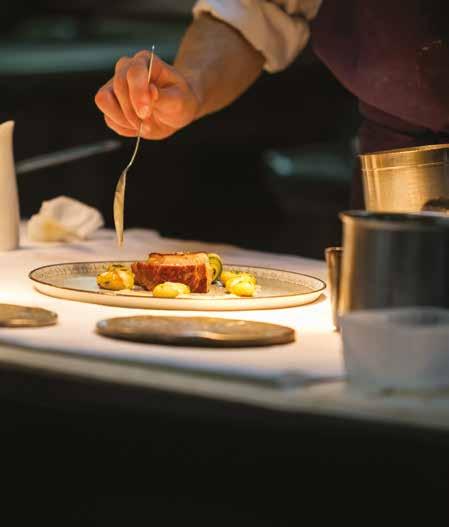







BY STACEY NEWMAN
Nicholas Patocki-Tomas, co founder and CEO of AskViolet.AI, is drawn to complexity. He’s worked in environments like McKinsey & Company, Amazon, and he spent time working in Europe, where he helped transform a four star boutique hotel. It was that hotel project that ultimately led him to envision a tech forward solution to one of the sector’s most stubborn operational challenges: the hotel phone.
In April 2025, Patocki Tomas co founded AskViolet.AI with senior technologist, Tyler Liu. The Toronto based startup has built a voice first AI hospitality concierge that aims to capture missed revenue, reduce operational strain, and elevate guest experience through always on, multilingual phone and text support.
“In hotels, missed calls translate directly to lost revenue,” says Patocki Tomas. “At the same time, answering every call creates operational friction, especially during peak periods. It’s a real trade off for staff. We saw an opportunity to eliminate that entirely.”
→
While Patocki Tomas has a background in engineering and an MBA from INSEAD, his interest in hotels stems from experience on the ground. During his time in Europe, he led a transformation strategy for a boutique property—an experience that exposed just how operationally intense and human dependent the hotel environment is.
“Hospitality is deceptively complex,” he says. “It looks simple from the outside, but there are multiple teams, a wide array of systems, and a relentless need for quality and attention to detail. And it’s all deeply human. That complexity is what drew me in.”
Together with Liu, he set out to design a system that could take pressure off staff without compromising service quality. The result is AskViolet—an AI hospitality voice concierge that answers phone and text queries around the clock in a natural, conversational tone tailored to the hotel’s brand and culture.
The Violet AI platform is designed to perform core front desk tasks: handling bookings, confirming late checkouts, responding to room service requests, and answering general guest queries. The goal is to maintain the hotel’s voice while freeing up staff to focus on high impact, in person interactions.
“We’re not building a chatbot. We’re building a task performing AI agent,” says Patocki Tomas. “Each Violet instance is unique to the property. It draws on a custom knowledge base and is trained to speak in a way that reflects the hotel’s brand identity.”
That customization goes beyond content. One early pilot client, for instance, requested a specific voice and tone to reflect that the hotel is Black owned to reflect the family ownership of the hotel. “It was a meaningful way for them to represent their culture to guests,” he says.
Violet also includes a visual dashboard for hotel teams, offering real time transcription of calls, analytics on frequent queries, and the ability to track recurring issues, such as maintenance needs in a particular room. “It gives operators insight into what’s happening in real time, which they often don’t have with traditional phone systems,” says Patocki Tomas.

AskViolet.AI is currently piloting with three hotels in Canada and is in discussions with others in both Canada and the United States. The company is also in early conversations with at least one international hotel group. While integration with property management systems (PMS) and phone systems (PBX) is in development, it’s not a barrier to early adoption. The pilots can be launched without full system integration, allowing for quick and low friction deployment.
“Integration is the next layer,” says Patocki Tomas. “But we didn’t want to make that a prerequisite. Each hotel works at a different pace, and we want to meet them where they are.”
The system is designed to learn and adapt over time. Each hotel’s Violet instance evolves based on real interactions, enabling smarter, more personalized guest engagement. For example, if guests regularly inquire about the pool, the AI can be trained to anticipate that question or offer information about related services, such as spa appointments or extended stays.
Violet supports over 160 languages and can handle 100 per cent of inbound calls 24/7. Guests are informed they’re speaking with Violet AI during the greeting, typically something like: “Hi, this is Violet AI, your voice concierge for [hotel name]. How can I help you today?” This satisfies transparency expectations while maintaining a natural interaction style.
When calls veer off topic or become inappropriate, the AI is programmed to redirect the conversation or shut it down politely. “We’ve had questions about how Violet handles sensitive or even illegal requests,” says Patocki Tomas. “It’s designed to respond simply: ‘I’m here to help with hotel related services.’ And that’s where the conversation stays.”
While automation and AI in hospitality often draw concern about job losses, Patocki Tomas is clear: AskViolet.AI is a support tool, not a replacement. “This is not about cutting staff,” he says. “It’s about allowing them to focus on meaningful work—the in person experiences that make hospitality special.”
For many hotels, front desk staff are pulled in multiple directions—managing check ins, resolving guest issues, and fielding constant phone interruptions.
Violet is designed to reduce that pressure without compromising guest access or quality of service.
“AI can eliminate repetitive, administrative work,” he says. “And that means staff can focus on hospitality, not on holding the phone.”
The technology also opens the door to a more seamless, integrated guest journey. Future iterations could incorporate curated partnerships with local restaurants, attractions, or services. “You could imagine a Violet that recommends a nearby Caribbean restaurant because it knows that’s part of the hotel’s brand culture,” he adds.
AskViolet.AI arrives at a time when AI capabilities—particularly in voice—are advancing at unprecedented speed. Patocki Tomas points to benchmarks suggesting that more than half of people interacting with today’s most advanced voice AI systems can’t tell whether they’re speaking to a machine or a human.
“That number is going to rise dramatically by 2026,” he says. “We’re not just seeing incremental improvement anymore—we’re seeing exponential leaps, month by month.”
The implications for hotels are significant. As AI becomes more capable, smaller teams will be able to operate more efficiently, provide around the clock support, and offer multilingual service without additional overhead. “AI can raise the baseline for every hotel,” says Patocki Tomas. “It’s going to enable properties to operate at a higher tier without having to scale their workforce the same way.”
That’s a particularly important proposition for independent hotels, which often operate with leaner teams and fewer technology resources. For that reason, AskViolet.AI is focusing early deployments on independents, while planning future rollouts with larger groups.
“Independent properties are ideal partners at this stage,” says Patocki Tomas. “They have shorter decision making cycles, and their diversity helps us validate different use cases. But the long term goal is to scale internationally.”
AskViolet.AI is structured to stay lean. The core team is small, and the company is using generative AI tools internally to manage workflows and development. Recently, AskViolet. AI secured early stage investment from Antler, a global venture capital firm that backs promising startups at the pre seed and seed stages.
“That capital is helping us refine the product and focus on partner success,” says Patocki Tomas. “We’re not rushing to hire. We’re being intentional about growth and focusing on getting Violet right.”
The company does not yet have a published case study, as it is still collecting data from its pilot sites. “The hotel industry is seasonal,” says Patocki Tomas. “We want to understand performance across high and low periods before we share formal outcomes. But the early results are very encouraging.”
Patocki Tomas is candid about what the company is looking for next: partnerships with curious, forward thinking hotel operators who want to test new tools without committing to a full scale transformation.
“We don’t expect operators to overhaul their operations overnight,” he says. “But we do need them to start asking questions and exploring the possibilities. You can run a small pilot and get a real sense of the impact.”
Ultimately, he believes that AI won’t replace what makes hotels special, but it will reshape how those experiences are delivered. “Hospitality is about people,” he says. “But people need tools that support them. That’s what Violet is about— keeping the human in hospitality, while using technology to eliminate the friction.”
FOUNDED 2025
HEADQUARTERS
Toronto, Ontario FOUNDERS


PRODUCT
AskViolet — AI hospitality voice concierge
CORE CAPABILITIES
24/7 voice and text assistant, multilingual support (160+ languages), booking automation, call transcription and analytics, custom tone and branding, PMS/ PBX integration
PILOT STATUS
Three Canadian hotels active, additional pilots in negotiation in the U.S. and Canada
INVESTMENT
Backed by Antler, a global early stage VC
WEBSITE askviolet.ai

Why hospitality finance demands a different kind of AI
FROM FAIRMAS
The hospitality industry has traditionally been cautious about adopting new technologies, but change is no longer optional. As artificial intelligence (AI) gains momentum, it is not just a buzzword. It is a practical next step with the potential to transform how hotels plan, analyze, and optimize their finances.
At Fairmas, we are not focused on flashy features. We believe AI must be secure, purposeful, and designed to solve real business challenges, especially in a data sensitive and highly complex field like hospitality finance.


International Marketing & Communications Manager

To explore this further, our international marketing and communications manager, Kinza Raheel, sat down with Sundar Sitaula, data scientist at Fairmas, for an open conversation about the real role of AI in financial planning. From revenue optimization to access security, Sitaula shares an honest and insightful view of how AI is evolving within our industry and at Fairmas.
KINZA:
Sundar, welcome! Let’s get right into it. The hospitality industry often seems hesitant to embrace new technologies. Why do you think AI still feels “futuristic” to so many in this space?
SUNDAR:
Thanks, Kinza! Great to be here. Yes, AI still feels futuristic because most people associate it with consumer experiences, like voice assistants or travel apps. But when we talk about AI in hospitality, financial planning and analysis, we are dealing with a whole other level of complexity. It is not about novelty. It is about precision, security, and actual business outcomes.
KINZA:
So, let’s talk application. Where exactly is AI making an impact in hospitality finance?
SUNDAR:
There is a lot of value across key areas:

• Dynamic pricing and revenue management: AI fine tunes rates based on real time demand.
• Forecasting and budgeting: It identifies patterns that humans might miss.
• Operational efficiency and cost optimization: Smarter allocation, lower waste.
• Energy management: AI helps reduce utility costs.
• Automated reporting: Time saving and consistent.
• Anomaly and fraud detection: Especially important for maintaining financial integrity.
KINZA:
That’s powerful. But I imagine with great data comes great responsibility. Let’s talk about access security.
SUNDAR:
Exactly. And this is where things get serious. Most general AI models are not built with deep access control in mind. Anyone can ask anything, and that just does not work for us.
In hospitality finance:
◆ Not everyone should be allowed to access everything.
◆ Nobody from outside the organization should have entry.
◆ Internally, access must be very granular and highly specific, based on user roles.
And 100 per cent accuracy is essential. Financial data leaves no room for approximation or 99 per cent accuracy.
This makes our use case far more complex than consumer tools. We are not asking AI for a holiday recommendation. We are asking it to support critical business decisions that can impact millions in profit.
KINZA:
So, AI in this context is not just another fancy tool. It has to be secure and purposeful.
SUNDAR:
Absolutely. Even though, from a sales & marketing point of view, it is sometimes tempting to offer a quick and simple ‘wow’ effect. However, it is not in our nature to resort to sudden or superficial gimmicks. Our goal is to provide relevant solu tions that deliver genuine value to users while upholding our established standards of excellence in data protection and confidentiality.

KINZA:
That’s a great philosophy. On a more personal note, based on your experience, how does this compare to other B2B AI use cases?
SUNDAR:
It is significantly more demanding. Compared to other B2B AI use cases, hospitality finance involves a unique level of complexity and unpre dictability. Unlike industries such as manufactur ing, where conditions are relatively stable, hotels operate in an environment that can change hourly. Factors like weather, local events, traffic condi tions, and even last minute group bookings can dramatically impact performance and planning.
What makes it even more challenging is that no two hotels are exactly the same. A hotel near a major attraction will have very different business dynamics than one in a quiet business district. These differences mean that financial planning must be highly customized, with constant adjustments based on real time inputs. That’s why at Fairmas, we focus on building AI that is not just powerful but also deeply tailored, responsible, and secure, because in hospitality finance, there is no one size fits all approach.
KINZA:
Well said. Thank you, Sundar, for sharing these real world insights. It is clear that AI in hospitality finance is not about hype. It is about building meaningful, secure, and practical solutions that truly make a difference.

AI is not a magic solution, and it should not be treated as one. As Sundar highlighted, it is a tool that supports human decision making. The strength of AI in hospitality finance lies in its ability to process vast amounts of data, identify trends, and enhance accuracy, all while keeping data protection front and centre. AI in hospitality finance is not about replacing people; it’s about enhancing human decision making with precision and foresight. Hoteliers should start small: identify recurring financial tasks that consume time or cause delays and explore AI powered tools that can streamline those tasks.
The industry needs to work with technology partners like Fairmas, those who understand the nuances of hospitality, not just generic AI vendors. Most importantly, AI should be approached not as a trend, but as a strategic tool. At Fairmas, we don’t chase hype; we focus on delivering solutions that provide real value. Every AI feature we are developing must meet the highest standards of data security, accuracy, and business relevance.
The financial planning needs of the hospitality industry are complex. But with the right application of AI and software purpose built for hospitality, they can be addressed more intelligently, securely, and effectively. Fairmas software solutions, further enhanced with AI, empower smarter decision making, strengthen forecasting accuracy, streamline budgeting, and support more effective financial planning across hotel portfolios: ultimately boosting profitability.
fairmas.com


BY ALLAN LYNCH
Washington’s hourly recalibration of tariffs and continuing insults haven’t only disrupted manufacturing and imports. It’s causing a massive rethink and rescheduling in North America’s $119 billion business events sector.
Meetings, conferences, conventions, trade shows, incentives, AGMs, board meetings and new product launches are scrambling. Potential attendees, speakers, sponsors and exhibitors are concerned about crossing the U.S. border. Will they be denied entry, detained, have materials confiscated, and samples tariffed?
One of America’s biggest exhibitions, the Consumer Electronics Show (CES), drew 142,465 attendees to their January 2025 Las Vegas show. Since 40 per cent of attendees came from outside the U.S., CES organizers are launching a new show in Amsterdam in October. Las Vegas will still be home to their main show, but to maintain their dominant position, organizers have to consider the discomfort of international attendees.
Canadian convention centres from across Canada are reporting an increase in interest from domestic corporate groups. Claire Smith, vice president of marketing and sales at the Vancouver Convention Centre, says, “We’re definitely seeing a shift. Canadian organizations are choosing to stay closer to home, and that’s led to more bookings for us. At the same time, we’ve noticed a drop in attendance from American delegates. So, while we’re still seeing strong activity overall, the composition of that business is changing.”
The Canadian Association of University Teachers issued a warning to members against non essential travel to the U.S. due to the “political landscape.”
One academic group, the North American Society for the Sociology of Sport (NASSS), is creating a new type of adoptable hybrid event which overcomes the border fear.
NASSS had their national conference booked for Seattle in November. President elect Professor Travers (they don’t use a first name) of Simon Fraser University, Vancouver, says, “With Trump’s threats to annex Canada and the tariffs, I started to have anxiety about travelling to the United States. As a trans person, I don’t know if they’re going to let me in.” Travers’s concerns for NASSS members were amplified by the organizer of a Victoria conference, who said 40 per cent of attendees simply weren’t coming. “Those were the Americans worried about what would happen when they attempted to return to the United States.”
Since cancelling Seattle to relocate to Canada would trigger a $71,000 USD penalty, NASSS negotiated a scaled back event with their host hotel. “We decided to offer a parallel conference in Vancouver.” So, while the whole group won’t be together, they are creating the option for a simultaneous face to face in two cities as well as the virtual element. NASSS booked event space at the University of British Columbia in Vancouver and negotiated group rates with hotels without bedroom minimums.
Additionally, Travers says NASSS booked Calgary for 2026 and “We’re already looking for a suitable American site in the same time zone.”
The U.S. Travel Association suggests boycotts could result in a 10-20 per cent loss of Canadian business.
Zoom/virtual meetings, years of lockdowns and remote work have driven a desire for face to face events, which makes a two nation event attractive for the duration of this Administration. It can also make attendance more affordable since attendee costs are in Canadian dollars.
The U.S. Travel Association suggests boycotts could result in a 10 20 per cent loss of Canadian business.
In May, the World Travel and Tourism Council (WTTC) reported that of the 184 economies surveyed, only the United States would likely experience a drop in international visitors in 2025. The WTTC predicts that, even with America 250th celebrations, the FIFA World Cup and Olympics, it will be





At least for the only Canadian properties that have received the ‘Three Michelin Keys’ designation
BY ALLAN LYNCH
In the year since The Michelin Guide began rating Canadian hotels, the first Three Michelin Key properties, Clayoquot Wilderness Lodge and Fogo Island Inn, report measurable, positive results.
Sarah Cruse, general manager of the Clayoquot Wilderness Lodge, says, “We were incredibly proud to be one of two Canadian properties recognized in the Michelin Keys selection. It’s been a meaningful endorsement—not only of the lodge’s elevated guest experience but also of our team’s passion and commitment to creating something truly special in the heart of the wild.
“Since the announcement, we’ve observed a noticeable uplift in interest across digital channels, particularly from international markets that hold the Michelin name in high regard. There has been a measurable rise in direct traffic and enquiries, especially from the U.S., Canada, the U.K. and Europe.
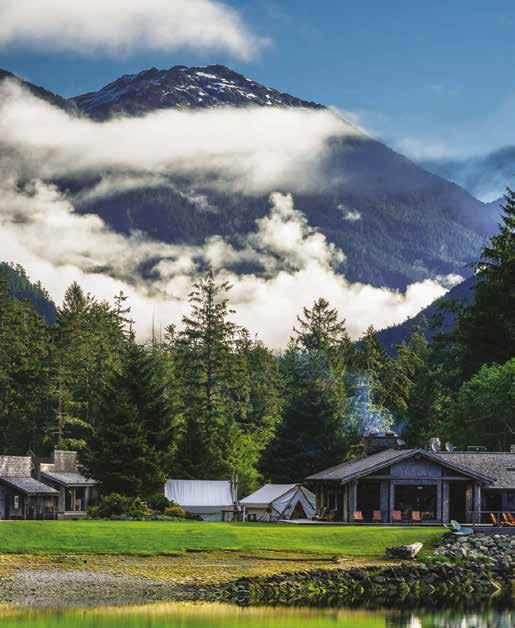
“The day of the announcement, we saw a 925 per cent increase in organic search result clicks and a 350 per cent increase in organic search result impressions to our website. In our digital advertising, the paid social ads which reference the Michelin award are our best performing ads with a combined reach of 1,013,327 and combined impressions of 2,994,200 (as of June 14).”
According to Cruse, the growth appears to be primarily driven by independent, high net worth travellers who are curious about remote, nature based experiences with a luxury edge. “That said, we’re also seeing an encouraging uptick in enquiries from small corporate groups and incentive houses seeking once in a lifetime experiences that align with their brand values,” she explains. →
“
Since the announcement, we’ve observed a noticeable uplift in interest across digital channels, particularly from international markets that hold the Michelin name in high regard.”
Cruse adds that the designation has also had a positive impact on staff. “There’s a genuine sense of pride among the team, knowing their knowledge and expertise contribute to something internationally recognized. It has also supported our ability to attract top tier hospitality professionals, particularly those seeking to align with values driven, experience led properties.”
It’s a similar story in Newfoundland, where Sarah Jue, of the Fogo Island Inn marketing department, says, “Place is at the heart of everything we do, and this distinction is a meaningful affirmation of our approach. We’ve seen a year over year increase in demand, which we attribute not only to the Three Michelin Keys designation,

but also to our membership in Relais & Châteaux, and our continued commitment to providing an exceptional level of hospitality and care for every guest.”
As for increased response, Jue says, “Yes, we’ve seen a notable uptick across all of our owned channels. Website traffic has increased, and our social media platforms have experienced growth in both followers and engagement in 2025 compared to 2024. We’ve welcomed more guests from the U.S., as well as from the U.K., Australia and other international markets,” as a result of the Michelin rating. “The recognition has helped expand our reach beyond our established audience.”
Like Clayoquot, Fogo has also seen a growth in interest from corporate groups and incentive houses, particularly those drawn to the emphasis on design, service, sustainability, and community.
“One of the most meaningful surprises has been the depth of response; not just from guests, but from our team and community. Michelin [designations] carry a certain global weight and recognition, and we’ve seen how the designation has sparked genuine curiosity and interest from travellers who may not have been previously familiar with Fogo Island. Compared to other ratings systems, the Michelin Keys feel particularly resonant because they go beyond luxury to acknowledge values like sense of place, and purpose driven hospitality,” says Jue.
In an era where anyone with web access can become a reviewer, Michelin’s well known tight control on their standards seems to resonate with experienced travellers.
The hospitality sector has long had stars and diamonds to help guests know the service and accommodations levels to expect. Those have been added to membership in groups like Relais & Châteaux, Preferred Hotels, Leading Hotels of the World, Preferred Hotels of the World, Luxury Spa Hotels and others. Stars, as a rating symbol, which are perhaps the best known measure of accommodations, have also been the most misused as a symbol. For the last 15 years, a French cruise company has consistently advertised “six star luxury,” and another tour company promotes its “six star luxury sailing yacht” even though no recognized rating group goes beyond five stars.

The abuse of the rating system may have begun innocently. A former communications manager for the Jumeirah Group said when they opened the sail like Burj Al Arab in Dubai in 1999, an enthusiastic journalist wrote, “One cannot recognize Burj Al Arab’s standards with 5 stars, Burj Al Arab had to be the first 7 star luxury hotel in the world. “That’s where it came from, but officially, Burj Al Arab is a 5 star hotel,” he explains. Even so, that “seven star” rating still lives on the web.
While the industry knows no such six and seven star standards exist, that hasn’t inhibited groups in Portugal, Turkey, Italy, Iran, Pakistan and China from claiming six and seven stars for their new developments.
It’s only been in the last 20 years that France, the U.K. and Europe began standardizing their hotel ratings. In the meantime, many other qualifiers have emerged, such as “gay friendly” and “Green/ LEED Certified Property,” etc.

Further complicating the rating system was the 2008 downturn in the U.S. economy. In April 2009, Bloomberg News reported that some U.S. hoteliers were giving up stars as an economic measure. The goal was to reduce service levels, which reduced star ratings, until the economy recovered. A retired Hilton executive told Bloomberg, “Ratings aren’t based on making good returns on your investment.”
Fortunately, in an era when the travel sector is deeply focused on luxury travel, Michelin carries weight with consumers. Carly Grieff, communica tions manager for the Michelin Guide in Canada and the United States, provided comments and observations from the chief inspector of the Michelin Guide North America, who, like their reviewers, remains anonymous.
Michelin sees hotel guide users as followers of their restaurant ratings. “Our user base consists of those who have followed the Michelin restaurant selection (and our famous Stars) and are eager to embrace the hotel platform with our new Michelin Keys program. Just like a Michelin rated restaurant, a Michelin rated hotel can earn One, Two, or Three Keys.
• One Key: a very special stay.
• Two Keys: an exceptional stay.
• Three Keys: an extraordinary stay.
“Our One and Two Key distinctions denote some of the best places in our selection. And if you’re anywhere, anytime, and you can make it to a Three Key hotel, do whatever you can to get there for a night. It’s one of the most outstanding experiences in the world.”
In terms of how properties are selected for review, Michelin says, “Our selection team goes to great lengths to select the most exceptional hotels around the world. Hotels in the Michelin guide are chosen for their strong personality, attention
“ One of the most meaningful surprises has been the depth of response; not just from guests, but from our team and community.”
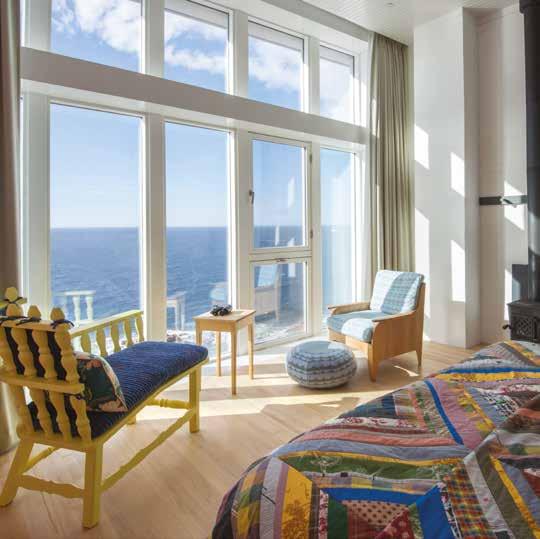
to detail and exceptional level of service. Each property is a destination in its own right, offering travellers a memorable experience.”
“The Michelin Guide’s recommended places to stay are selected without quotas and across a wide range of styles, locations, atmospheres and prices. Established hotels with international reputations are included in the selection, as well as other more recent discoveries or establishments that have only just opened for business. What they all have in common is that they meet five quality criteria, as evaluated worldwide by the Michelin Guide’s hotel experts:
• A destination in its own right: the hotel contrib utes to the local experience.
• Excellence in interior design and architecture.
• Quality and consistency of service, comfort and maintenance.
• Individuality reflecting personality and authenticity.
• An extraordinary experience for the price.
“It’s important to note that we have a broader selection of recommended hotels beyond just those who have been awarded Keys. As of [June 2025], we recommend over 7,100 hotels across 135 countries, and this is growing in real time.”
Properties chosen for review are revisited on an annual basis, so it’s not a one and done deal.
As to what Michelin reviewers would advise hotels/hoteliers to consider, they suggest, “Considering practices and products on their property that are environmentally friendly. It’s entirely possible to have an outstanding hotel while also making efforts to be more sustainable.” Michelin also suggests hoteliers embrace “sustainability and a strong commitment to their local communities.”
For properties which are solely rated with non Michelin stars, Ronald van der Weegen, managing director of Dartmouth based Quality Visitor Services, one of the Canada Select rating

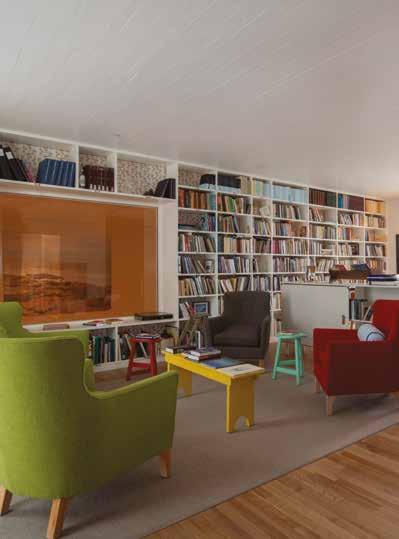

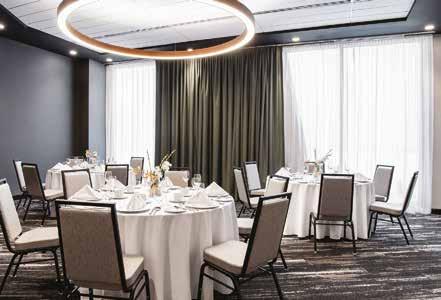
groups, says in response to the internet and user feedback “Canada Select worked closely with other rating programs from around the world in revising the criteria based program to a more fluent and adaptable program. The rating program is now extensively based on quality, cleanliness, and state of repair, ensuring properties are clean, safe, secure and well maintained, while exceeding consumer expectations. With the influence of the internet, owner/operators are able to focus on their specific consumer expectations as opposed to a rating program advising them to put in criteria items that don’t meet their specific target markets.” This new star flexibility maintains a professional standard, but recognizes that not everyone is catering to the carriage trade.
Nevertheless, having Michelin rated Canadian properties seems to be good news for all. It brings attention to the nation with travellers whose knowledge of Canada might mirror Voltaire’s dismissive description of our country as “a few acres of snow.”
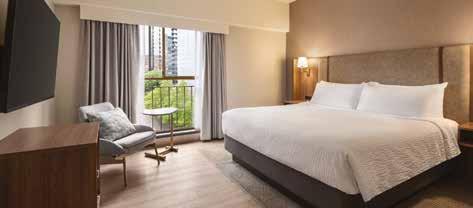
Ownership groups across Canada trust us to optimize performance for independent hotels and resorts as well as multi-national hotel brands such as Marriott, IHG, Hilton, Choice and Wyndham. Your success is our success.
BY STACEY NEWMAN
IMAGES BY INNFOCUS PHOTOGRAPHY
Launched in 2023, Innfocus Photography is a Canadian company founded by Steve Carter and Kalli Sagos, a couple who combined their professional expertise and industry connections to address a growing demand for hotel photography. In just over two years, they’ve completed projects for more than 300 hotels across Canada, the United States and Europe. Their clients include Hilton, Hyatt, IHG and a range of independent and boutique hotels. What distinguishes Innfocus’s approach, they say, is a focus on hospitality and quality, not just content creation. In this interview, the co founders explain the business model, how photography can drive hotel revenue, and what makes their growing network of photographers and editors central to their work.

TELL ME HOW INNFOCUS PHOTOGRAPHY WAS FOUNDED. WHAT INSPIRED THE SHIFT TO HOSPITALITY PHOTOGRAPHY?

KALLI: Steve and I are both partners in life and business. Innfocus was founded in 2023 by the two of us. Steve had been in the industry for 12 years by then, working with a few other photography companies in Canada. His core value has always been relationship building. He even took a break from the industry in 2022 and went to work for Dale Carnegie, which probably says a lot about how he interacts with people—How to Win Friends and Influence People, right?
At the time, I was working in pharmaceutical publishing— Canadian Healthcare Network. Steve had his full time job, and we just started building Innfocus. It's grown quickly— we’ve built an amazing team, and we’re both doing what we love.
WHAT WAS YOUR CONNECTION TO THE HOTEL INDUSTRY THAT HELPED YOU IDENTIFY THIS AS A NICHE?

STEVE: When I stepped away in 2022, it was gradual. But people kept reaching out, asking questions like, “Where did you go? Who do we talk to now? Do you recommend anyone?” I realized how hard it was to recommend someone else because I knew the level of service and quality that was expected. We started Innfocus. We went all in—rebuilding connections, hiring the right team—and it started to snowball.
HOW HAS YOUR BUSINESS MODEL EVOLVED SINCE LAUNCHING INNFOCUS?
STEVE: Our first project as Innfocus was for a former hotelier who had moved into the storage facility business in Michigan. He asked if I was still doing photography. I said no—and he said, “That’s too bad.” He had several properties he wanted photographed. We helped him out, and that was our first invoice.
Within three months, we became a Hilton preferred vendor for seven of their brands—and have since added two more. That gave us a big lift. As of Christmas 2023, we both left our full time jobs. Now, in 2025, we’re preferred vendors for Hyatt, and we’ve submitted a full RFP to IHG. We were also added to Hilton’s Tapestry Collection vendor list.
HOW HAVE YOU SCALED TO OVER 300 HOTELS WITHOUT COMPROMISING QUALITY?
STEVE: We’ve built a team we’re incredibly proud of—editors in Canada and Europe, photographers across North America. Everyone brings something valuable, and we’ve created systems that allow us to scale without sacrificing quality. That includes regional assignments and a strong post production workflow.
DO YOU CONSIDER INNFOCUS PHOTOGRAPHY
A HOTEL PHOTOGRAPHY AGENCY?
KALLI: We do. We’re not just serving hotel clients; we’re also approached by photographers who want to get into hospitality. Some are coming from real estate or commercial work and appreciate the creative opportunity and steady workflow.
STEVE: Most of them don’t want to sell or manage clients. They just want to shoot and know their work is in good hands. That’s where we come in. I joke that I’m their agent. We handle outreach, brand coordination and editing—they show up and shoot.
ARE YOU PHOTOGRAPHERS YOURSELVES?
KALLI: I’ve taken photography courses and have a strong eye for detail, and I’m involved in many projects. But technically, no—we’re not photographers. That’s why we rely on our team. They’re the talent.
STEVE: Kalli is our QA specialist. She works closely with our editors to ensure everything meets both brand and internal standards.

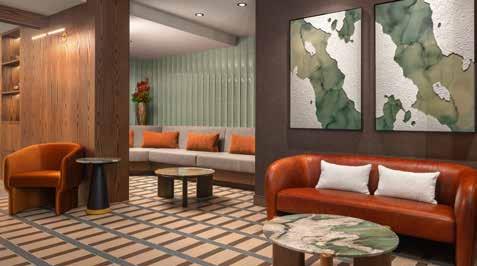

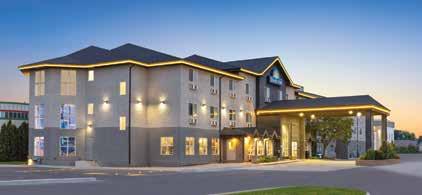
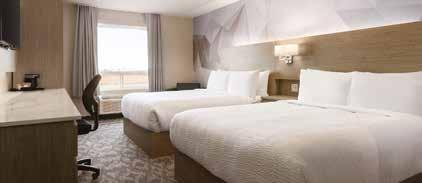




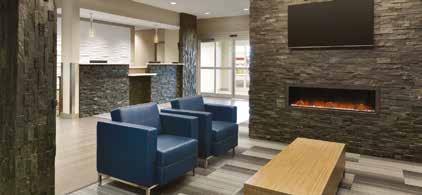
1. KNOW YOUR BRAND STANDARDS: Each hotel brand has specific photography requirements for composition, resolution, angles, and subject matter. Ensure your photographer has access to current brand guidelines and understands them thoroughly.
2. DON’T ASSUME “GUEST-READY” MEANS “PHOTO-READY”: Rooms that are clean and ready for guests often still require visual staging for photography. This includes smoothing bedding, removing clutter, adjusting lighting, and highlighting architectural lines.
3. INVEST IN THE RIGHT TYPE OF PHOTOGRAPHER: Hotel photography is a specialized discipline. Avoid generalists unfamiliar with brand compliance, architectural angles, or OTA-specific image standards. Experience in weddings or real estate doesn’t always translate.
4. CREATE A DETAILED, PROPERTY-SPECIFIC SHOT LIST: Collaborate with your photographer to develop a list that reflects your amenities, location and unique features. Include required brand shots, but also consider adding lifestyle, food and beverage, and social media content.
5. AVOID OVERUSING ULTRA-WIDE LENSES: While wide angles are sometimes necessary, excessive use can distort the space and mislead guests. Prioritize honest representation to manage expectations and reduce complaints.
6. HIGHLIGHT WHAT SETS YOUR PROPERTY APART: Show more than beds and bathrooms. Include photos of your breakfast setup, outdoor amenities, pet-friendly areas, event spaces, or local artwork — especially if they reinforce your value proposition.
7. BUDGET FOR VISUAL UPDATES: Photography isn’t a one-time investment. Properties evolve over time, and your visuals should reflect changes in design, furniture, amenities or seasonal use.
8. PLAN FOR BOTH REQUIRED AND MARKETING IMAGES: In addition to mandatory brand shots, consider capturing creative content for use across your website, email marketing, print collateral and social platforms. One shoot can serve multiple purposes.
9. CLARIFY TIMELINES AND USAGE RIGHTS IN ADVANCE: Establish delivery timelines, file formats, editing scope and licensing terms before the shoot begins. Make sure you have the rights you need for long-term marketing use.
10. EVALUATE IMPACT, NOT JUST IMAGE COUNT: Strong photography supports OTA rankings, improves click-through rates, and helps drive direct bookings and F&B revenue. Consider how your photos are working for your business, not just how many you have.
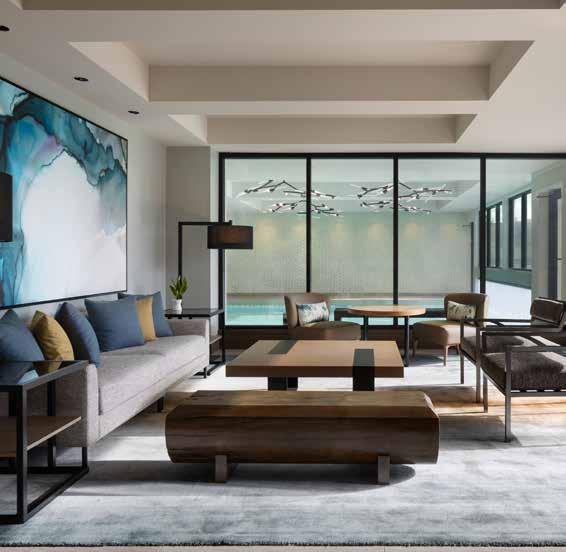
WHAT SETS INNFOCUS APART IN THE HOSPITALITY SPACE?
STEVE: Hospitality first—not agency first. We’ve worked with most major hotel groups at some point, and many know me personally. We’re not generalists. We don’t shoot weddings or real estate. We focus exclusively on hotels. We understand brand standards, OTA requirements and what makes a property stand out.
KALLI: We’re also proudly Canadian. We charge Canadian clients in CAD, and U.S. clients in USD—no surprise conversions.
HOW MUCH CREATIVE FREEDOM DO YOUR PHOTOGRAPHERS HAVE?
STEVE: We work within brand constraints but avoid defaulting to generic. Many hotels come to us after failing a brand QA audit with another photographer. We focus on consistency, quality, and getting it right the first time. Every property is unique, so we collaborate on a tailored shot list. When the budget allows, we also offer drone shots, lifestyle content, and social specific images to enhance the overall package.
KALLI: A great example is the Hilton Garden Inn in Sudbury. In addition to the required shots, we captured their F&B areas with a more creative approach. They host concerts and community events, and they’ve been using our photos for marketing far beyond the usual brand channels. It’s rewarding to see our work helping clients showcase their personality and stand out.
WHAT ARE SOME COMMON MISCONCEPTIONS HOTELIERS HAVE ABOUT PHOTOGRAPHY?
KALLI: One is that “guest ready” means “photo ready.” It doesn’t. We prep rooms— ironing or steaming bedding, adjusting pillows or towels, removing plastic wrap—all the small things.

Another misconception is the belief that “any photographer can do this.” Not all photographers understand architectural work or brand compliance. A wedding photographer or real estate shooter might not know what’s required for brand approval.
STEVE: And some think it’s a one and done checkbox. These photos last five to seven years. They’re a long term investment. Some ask, “Can you make the room look bigger?” and want ultra wide lenses, but that distorts the space and misleads guests.
WHAT TYPES OF IMAGES HELP DRIVE BOOKINGS?
STEVE: Detail shots. F&B images, lifestyle content, local touches—these are what convert. Some hotels rely too much on generic room photos, but guests respond to unique visuals: rooftop patios, pet friendly perks, breakfast spreads.
KALLI: Authenticity matters. Overselling visually leads to guest disappointment. We avoid artificial staging. We don’t fake furniture or superimpose décor. Everything in the image is real.
ARE YOU SEEING ANY IMPACT FROM AI IN YOUR WORKFLOW OR THE INDUSTRY?
KALLI: Not from the brands we work with. If anything, they’re adding more photographers, not moving to AI.
STEVE: AI helps our editors—removing cars or cleaning up small flaws—but we don’t use it to generate imagery. One client asked about virtual staging. We declined. The brand wouldn’t have allowed it anyway.
HOW DO CLIENTS MEASURE ROI ON PHOTOGRAPHY?
Steve: Some track it through revenue or booking metrics. Others don’t share numbers, but they keep hiring us—that tells us plenty. One Hilton Garden Inn reported a 40 per cent increase in F&B revenue after updating its images.
WHAT SHOULD PROSPECTIVE HOTEL CLIENTS KNOW ABOUT INNFOCUS?
STEVE: We live and breathe hospitality. This is what we do— and we love it. But we wouldn’t be here without our team. Our photographers, editors, stylists—everyone contributes.
KALLI: When we started, we didn’t expect this to become a full time business. But it has. We’ve made mistakes, we’ve learned, and we’re proud of the team we’ve built and the quality we deliver.





